#and the person answers out loud
Explore tagged Tumblr posts
Text
Actual Ultimate Classpecting Guide
For real this time.
Buckle up, this is a really long one. For everything that's posited, I can provide textual evidence; that being said, I'm not going to be including the textual evidence within the essay itself, because it's already long enough as-is. As such, please feel free to ask for clarification or sources on any assertion, and I'll do my best to provide.
Before we begin, there's some things to discuss about how we're going to be approaching classpect in the following essay. In numbered list form for our short attention spans:
1. There is a concept Hussie talks about multiple times in his book commentary, "personality alchemy" - the idea that there are these "platonic ideals" of certain characters, which can be mixed and matched with others, in order to create new characters. The examples he gives are of how Eridan was a proto-Caliborn, how Kanaya has shades of Jade, how Nepeta was a proto-Calliope, and how Sollux and Eridan have shades of Dave in them. Classpecting is fundamentally a form of this personality alchemy:
2. Class describes the character's arc and emotional hurdles, while Aspect describes the character's base personality traits by which this arc is experienced.
3. For example, all three Seers struggle with hubris: Rose's need to be the smartest person in the room led to her being manipulated by Doc Scratch, Terezi's obsession with meting justice led to her engineering a situation where the only option was to kill Vriska, and Kankri's desire to be seen as a spiritual leader amongst his friends led to him furthering their divisions and harming them.
Then, when their pride is shattered, they cope by inflicting willful self-blindness: Rose turns to drinking herself stupid (the opposite of Light's sway over knowledge), Terezi gets down with the clown (the opposite of meting out Mind's justice, as it's a Gamzee W), Kankri goes celibate (Blood L) despite his clear romantic feelings for certain teammates.
4. As for Aspect: note how all three Life players share the personality traits of optimism, stubbornness, and obstinacy. All three Breath players share an immaturity and naïvety, and are quite frankly irresistible to people for some reason. All three Light players share a need for the spotlight and a tendency toward long-windedness and persnicketiness. So on and so forth.
What's interesting is, if you start analyzing characters that share Classes and Aspects, these specific types of similarity crop up over and over - all our Knights struggle with insecurities and facades, both our Bards have a crisis of faith. All three Breath players have an aspect of immaturity and childishness to their characters, and all three Light players are deeply concerned with appearing intelligent and feeling important.
5. As a result, this guide is NOT intended for classpecting real life people, because we are complicated, we contain multitudes, and we don't have arcs. This is primarily an analysis of what Class and Aspect mean in Homestuck based on textual evidence, because I genuinely believe that you can basically figure it out if you read carefully.
6. Duality, and the idea of "equal and opposite," are major themes within Homestuck - Prospit and Derse, Skaia (described as a crucible of birth and creativity) and the Furthest Ring (the literal afterlife). Which classes are involved in an Active/Passive split, and opposing Aspects, are the same way. This is the primary method I used to determine the Active/Passive pairings and opposing Aspects. After all, as Callie describes, both Thieves and Rogues are classes "who steal" - so, too, do I try to unify Classes by a common theme, even if they diverge wildly in how that theme is expressed (as Thieves and Rogues do). In the same way as the opposite of "up" is not "apple," but "down", because "up" and "down" are both fundamentally concerned with relative vertical position, so too can be defined concepts like Breath and Blood, Hope and Rage, Light and Void - as well as the reasoning behind Class pairings like Heir and Page, Maid and Knight, and Seer and Mage.
7. Descriptions for both Class and Aspect are left deliberately vague and up to interpretation within the comic itself, and this is by design: the actual manifestations of an Aspect can vary wildly given the Class, and even individual person, that it's tied to. Calliope even makes note of the fact that, under the right circumstances, someone can manifest effects that appear to be the opposite of their aspect. She's also careful to couch her language in "may" and "can" - because these concepts are intentionally somewhat nebulous and malleable. As such, while this guide certainly lays down what can be gleaned and inferred from the text, do note that Homestuck runs on a soft magic system, and as such, nothing stated is firm, 100%, must-always-be-this-way - just an overview of what we've seen.
8. There is often great overlap between Aspects, Classes, and Classpects - which Calliope herself notes. Heart and Blood are one of the most salient, as they both have a fixation on relationships, and Calliope mentions that under the right circumstances, a Classpect may even be able to manifest what appears to be the opposite of their Aspect. Again, Homestuck operates on a soft magic system, so this is a feature, not a bug.
ASPECT
There's a little less to say about Aspect, not because it's less complicated, but because "base personality traits" are much more nebulous compared to Class's sway over character arc. Still, Aspect represents the fundamental way a character is, and thus, color every interaction that character has. There's a reason Ultimate Selfhood is sought through Aspect, not Class - Aspect is the core of the character's being, what makes that person that person.
That all being said, Class has major sway over how an Aspect manifests, and certain classes can even invert the Aspect and even the character's role in the party. As such, these descriptions must be parsed carefully in relation to Class. Moreover, due to the soft magic system, there is at times overlap between unrelated Aspects, which can also be exacerbated by Class - Heart and Blood being the most obvious in this regard. Still, overall, you'll find the Aspects to be fairly distinct from one another.
Please also note that every Aspect can deal with its literal counterpart by default - Light players can wield lasers, Breath players can wield the breeze, et cetera. Because this kind of goes without saying, and because the non-literal stuff is more interesting to discuss, I'm not really going to go into too much detail about the literal qualities.
Finally, something interesting to note is that nearly every Aspect follows its own Hero's Journey cycle - full actualization for each one usually means reaching around to its opposite Aspect, and taking lessons from them - for example, Breath players need to learn maturity and responsibility, while Blood players need to learn relaxation and whimsy. Thus, an Aspect at its worst manifests in two ways - either a toxic overabundance of the Aspect's worst traits, or such a dearth of the aspect that it begins to resemble its opposite. Only by reaching into the opposite, however, can the player be tempered and reach full maturity - can they become more of who they are.
SPACE / TIME
Space and Time are both concerned with physical reality, goals, and the way one approaches them.
Space is associated with "the big picture" - with recycling, reproduction, and the interconnectivity of all things. The aspect also presides over the enjoyment of the journey over the destination - Space players serve as reminders that the present moment is as important as the end goal. Space is often a more passive Aspect, being the stage upon which the story is set. They're the hosts of the party, and the one who marks the ending.
Its players reflect these tendencies, often being feminine, with penchants for life-giving acts such as gardening. Their personalities tend towards frivolity and silliness, finding it difficult to stay on-topic or bring full gravitas to serious situations. Perhaps a better word would be "distractable;" when the aspect is so concerned with all things in connection with each other, it's easy to lose track of details, and it's easy to enjoy things simply as they come. Space players tend to be kind, patient, and forgiving, which is a strength as much as it is a flaw; it's easy for malicious actors to take advantage of this compassion, or for the Space player to find themselves in a poor situation by being overly permissive. They can easily be painted over by stronger personalities, and tend to struggle with romantic relationships, as they attract many with their kind and giving natures, and few are naturally so considerate of the Space player in turn.
"Passive" is a good word to use; at a toxic overabundance of their Aspect, Space players are trampled underfoot. They become enablers, servants to dark forces, or so lost in their own worlds that they neglect the one they live in. With their Aspect "inverted," a Space player becomes a demon of poor prioritization. Distracting not just themselves from their true purpose, but others, too, the Space player will wreak havoc by overemphasizing unimportant topics and ignoring important tasks. This superficially resembles Time, in that the Space player will become fanatically dedicated to their task, but note that the poor prioritization is still Space-esque at its core.
Still, within this nadir is a valuable lesson: the strength of self-assertion, and the determination to see a goal through. These will allow the Space player to weed their garden, separating good from bad, allowing it to flourish like never before.
Time, in contrast, is associated with "the little things" - with details, minutiae, and processes. Time presides over the struggle toward something greater, the endurance of hardship with an eye on the prize - the destination over the journey. Time players are the ones keeping track of the tasklist, marking off each item as it reaches completion; they are the tireless workers keeping the whole engine running.
Time players, thus, are ones whose lives are marked by struggle. They are highly goal-oriented; in contrast to how Space players can easily move from goal to goal, task to task, Time players feel bound to see things through to the end, finding satisfaction only when they've achieved their desired result - and only until they come across the next goal in their journey. A Time player isn't happy without a goal to work towards, a craft to polish, a prize to win - but this driven nature can easily be its own downfall, as it leaves little room for the player to admit to their own shortcomings, or ask for help from others. Moreover, their focus on minutiae can leave them blinded to the bigger picture, and it's easy for a time player to fall to despair, able to do nothing more but spin their wheels. They're prone to directionless anguish, frustration, and resentment towards the seeming futility of their actions, becoming destructive and defiant even when it doesn't serve them to do so.
At a toxic overabundance of their Aspect, Time players become explosively destructive. The ultimate "goal" of all things is death, with which Time is associated, and accordingly, Time players have a penchant for aligning themselves with futility and entropy, struggling so hard that their thrashing leaves a trail of annihilation in their wake. With their Aspect "inverted," Time players detach entirely - they can become so fed up with struggle that they simply opt to lay their weapons down and let the end take them. It's very easy for them to come to the conclusions that either everything matters, or nothing matters. This superficially resembles Space and its big picture thinking, but note that its framework of struggle, and whether or not a goal needs to be pursued, makes it a Time concern.
But the inherent meaninglessness of existence is, in itself, an important realization to make - that whether or not anything "matters" in the grand scheme, things can still be worth doing, worth caring about, and worth investing in. This realization allows the Time player to attack their goals with renewed vigor and greater clarity, which in turn means that the party becomes an efficient, well-oiled machine.
BREATH / BLOOD
Breath and Blood are both concerned with directionality, interpersonal relationships, and autonomy.
Breath is the Aspect governing freedom, liberty, and independence; it is a force that breaks shackles, clears out social norms, and refutes "the rules," whatever those rules may be. Breath players can't be tied down, whether by physical bonds, societal rules, or even the ineffable forces of the narrative itself. They are leaders of example, pioneers, and trailblazers, opening new paths for their teammates to follow.
Breath players are goofy and gullible, often with hearts full of childlike whimsy, naivety, and even immaturity. They are friendly and well-meaning, fond of simpler things, and easily swayed by others. They approach the world with a sincere and innocent good-naturedness, like a baby animal before it learns to be fearful of danger. Something about this sincerity seems to make Breath players irresistible to others, and they often find themselves the subject of romantic attraction. However, in this childishness is also the great pitfall of many Breath players - their natures are naturally conflict-averse, and egotistical the way a child can be, failing to see beyond themselves. They can be incredibly callous when not considering the consequences of their actions, or the viewpoints of others.
At their worst, Breath players are irresponsible and callous. They'll shirk the consequences of their actions, blaming anybody but themselves, or simply choose not to care who they hurt in order to get what they want. They may even choose to stop making choices for themselves, leading to the "inversion" of their Aspect - a voluntary loss of freedom and independence, derived from an Breath-like aversion to responsibility, which superficially resembles the bondage of Blood.
But if they are able to overcome these tendencies, a Breath player will learn what true responsibility looks like - responsibility for themselves, their choices, and the effect they have on others. Armed with this, a Breath player's ability to break bonds can be focused into a clear force for good, clearing away all obstacles and harmful societal standards, leading the charge into something new and beautiful.
Blood, in sharp contrast, is the aspect that governs bondage, contracts, and interdependence. It is a force that binds. Under Blood's sway are not only romantic entanglements, but familial, friendly, and societal ones as well. This aspect sees overlap with Heart, but the division is this: Heart concerns itself with feelings, and Blood concerns itself with compatibility. Blood players are diplomats, forces that remind us all that we are more similar than we are different, and that that similarity should bring us together when we are on the verge of pulling apart.
Blood players, reflective of their Aspect's association with bonds, tend to be neurotic and obsessive. They have a tendency to over-examine and overthink, constantly fretting over the infinite and infinitesimal variables that influence the shape of society and interpersonal relationships. However, this judgmental nature stems from a deep well of idealism and empathy; Blood players can't help but care about others and wish for the best for them. In a way, this makes them one of the most mature members of the team, being concerned with its overall well-being. Unfortunately, their prowess does not extend inwards, and their assessment of themselves is usually direly incorrect - all the worse because Blood players always feel responsible for those around them. Blood, being the Aspect concerned with interdependence, is the weakest one when all alone.
Thus, it's easy for the Blood player to wind up controlling - desperate to make sure everyone is moving according to their vision, they'll become iron-fisted dictators, with a "my way or the highway" approach to social interactions. It's easy for them to wind up pariahs of their own making, becoming so critical of others, or so adamant about enforcing their own will, that they inadvertantly sever their ties - something that superficially resembles Breath's independence, but is truly a result of Blood's neuroticism.
But with that space and separation can come great clarity. Blood players must learn to relax their grip, and allow people room to breathe - including themselves. Once able to grasp that sometimes bonds must be forged with a soft touch, Blood players' natural empathy shines through, allowing them to build something so much kinder and greater than the sum of its parts.
LIGHT / VOID
Light and Void are both concerned with knowledge, ontology, and "narrative relevance".
Light (as well as its counterpart) are perhaps best understood through the lens of "narrative" - this idea that, of all things that do and don't exist, and all events that do and don't happen, only the ones put to page are "relevant". Thus, Light is associated with knowledge and luck - that is to say, it's associated with the knowable, the objective, and the concrete, and the ability to determine "important" events. Light players have read the book they're participating in, and able to serve as luminary guides from one plot point to another, lighting the lampposts for others to follow.
Light players, naturally, are erudite and educated, possessing keen intellects and cunning minds. They are fond of knowledge itself, of markers of status and prestige - whether that's wealth, the adulation of the masses, or a massive library. They harbor a desire to be important, to be seen, to be acknowledged, and are happiest when they are looked up to. Conversely, they deal poorly with being looked down upon. Their confidence transmutes easily into hubris, and they struggle with having that pride challenged. As such, they tend to be volatile and unpredictable, quick to retaliate against those who threaten their egos, or obsequious to those whose acknowledgement they desire.
Their desire for the limelight can quickly spell disaster - they can become incredibly cruel, harsh, and egotistical in their pursuit of narrative significance. They forget, in their obsession, that they, too, are fallible and flawed, and the inevitable reminder can come very harshly. Light players struggle with moderation, and as such, when they feel shame, they'll often take drastic measures to cope with it - deliberately darkening their own influence or intellects, removing themselves from the "story" entirely - something which superficially resembles Void's penchant for the background, but which is firmly rooted in Light's obsessive need for drama.
But in experimenting with narrative insignificance, Light players can reach an epiphany - in their absence, others may shine, and that can be a wonderful thing. Light players, then, can learn to shine not just for their own sakes, but for the sake of others, allowing them to weave a story even more brilliant than any that can be weaved alone.
Void, in contrast, is the blank spaces between the words. That which is secret, subjective, unknowable - these are Void's domain. It's associated with taboos and hidden things, sexuality and pleasure. It's also associated with the empty canvas - the blank space before creation, and the oblivion to which creation is eventually destined for. Thus, it stands for infinite possibility, though the collapse of those possibilities into a reality removes that reality from Void's domain.
Thus are Void players ever cosigned to the background, though this generally suits them fine. Void players are very self-possessed. Where Light players tend to exaggerate and complicate, Void players are honest and simple, preferring straightforward solutions. They don't tend to think very hard, instead letting intuition and emotion guide them to where they want to be - which makes them one of the more stable personalities on a team. However, this simplistic, feelings-driven approach often leads to pleasure-seeking behavior, poor impulse control, and overindulgence in vice, and from there, to irrelevance, with which Void is so closely interlinked.
Void players are especially prone to vice, and at their worst, will become so drunk on pleasurable activities that they pursue them to the active detriment of the party's goals or the Void player's self-improvement - making them the ultimate irrelevant character. They can also very easily drag others into their mélange, with a forcefulness that resembles Light's illuminating guidance, but which is ultimately rooted in Void's pursuit of personal pleasure.
But there's a lesson to be learned in Light's domain: how to bring themselves into relevance and greatness. A Void player, once they learn to pursue not just personal pleasure, but a greater satisfaction for the collective whole, can drag the Void behind them, kicking and screaming, to where it'll be of use.
MIND / HEART
Mind and Heart are concerned with what it means to be a sentient being, with identity, and with why we do what we do.
Mind is the Aspect associated with logic, rationality, karma, ethics, and justice. To a Mind player, they "are" because they "think". They are keenly aware of the consequences of every action, and well-versed in cognition and behavior, such to the point of manipulating others with ease. Deeply concerned with the "effect" of cause-and-effect, Mind players are always cognizant of debts and credits, where justice is owed and where it has been over-meted, and their subtle machinations culminate, like well-placed dominoes, in grand and explosive finales.
Mind players are schemers - it's in their nature. They have a tendency to view the world as a puzzle or game, with themselves and the people around them as pieces on a board, and set as their standard rules the laws of ethics and karma - owed debts and overhanging credit - guilty and innocent. Mind players are wickedly cunning, and have an high success rate with every scheme they commit themselves to, but the grand downfall of all these tendencies is that they tend to lack in a sense of identity, and have a poor grasp on their own emotions or desires. While they may know how to provoke a desired reaction, they don't know how to change someone's mind. They often find themselves grappling very painfully with their own selfhood, with feelings of emptiness, inadequacy, or uncertainty.
Thus, a Mind player at the worst zenith of their Aspect is heartless and cruel. Leaving no space for empathy or even personal feelings in their plans, the Mind player will plot for an ending as heartless as they are. But a Mind player is never truly without emotion, and ignoring their own feelings causes them to manifest in terrible ways - Mind players have a tendency to seek toxic, codependent relationships, hoping to find external validation, subjecting themselves to the wishes of others, which can appear like Heart's fixation on feelings and desire.
But in recognizing their own need for emotional validation, and the importance of their own feelings, a Mind player can realize that there's an entire dimension to the game they've been playing that they've been ignorant of. When a Mind player learns to temper their schemes with empathy, compassion, and kindness, how much more success they'll see - and how much happier that grand finale will be!
Heart, then, is associated with feelings, motivations, intuition, the soul, and the self. To a Heart player, they "are" because they "feel" like they are - and they're keenly aware of the multitudes that are contained within themselves. Deeply concerned with the "cause" of cause-and-effect, they're drawn to desires, those of themselves and of others, especially where strong feelings are concerned. Heart players are gifted with an intuitive understanding of those around them, both their good and bad qualities, and are tasked with the grand task of bringing out the best.
It stands to reason, then, that Heart players have a firm grasp on who they are and what they want. For the same reasons, it's difficult for a Heart player to truly hate or condemn another person, because they are so adept at understanding them. However, this understanding comes with a price - because the Heart player is so aware of themselves, they can't escape their own worst traits - nobody self-loathes as accurately as a Heart player can. Nor can they ever truly be untruthful with another, making them poor manipulators. Capable of presenting a different facet of themselves as the situation calls for it, certainly, but just as it's impossible to lie to a Heart player, who always knows how someone really feels, it's impossible for a Heart player to lie to themselves.
With this sincerity comes vulnerability. Heart players wear theirs on their sleeves, and at their worst, this can make them demanding, needy, and sensitive - so eager to connect with others emotionally that they'll cramp themselves to fit others' desires. But they can't ever keep this up for long; Heart players have a tendency to withdraw from others after being hurt too often, finding it easier to be alone and silent about their feelings than to deal with the pain of rejection. They may even work to manipulate others, preying on their emotions and desires to force them to act in their worst interests. This superficially resembles Mind's cold logic, but unlike Mind's cool rationality, Heart's aloofness is a mask, an attempt to avoid pain by pulling away.
But this isn't purely a negative, because a Heart player can learn a healthier form of detachment, and separate out healthy and helpful desires from harmful and detrimental ones. Given this clarity, the Heart player becomes the team's emotional core, able to raise up each teammate's best qualities, while helping them deal with their worst, enabling everyone to be the best possible version of themselves - which the Heart player knew them to be all along.
LIFE / DOOM
Life and Doom are concerned with outlook, with journeys, and with trials and tribulations.
Life is an aspect concerned with healing, growing, and improving. It is associated with beginnings, optimism, and positive emotions. The very essence of Life lies in its healing abilities, in this idea of overcoming the odds and triumphing over hardship and difficulty. Life is action, movement, and motion, and its players can scarcely hold still. Life will find a way - and Life players harbor the same immutable belief; they are the most stubborn weeds in the garden, the cockroach that survives the apocalypse, and the beating heart that refuses to stop.
Life players tend to be optimistic and confident. They are self-assured individuals, with a stubborn belief that good things are on their way, and any hardship they face is not only temporary, but something that can be overcome. They can find the silver lining in any cloud, and enjoy themselves under any circumstance. They love to nurture, to care for others, though this love has a tendency to be one-sided. Indeed, Life's stubborn nature is its players' greatest pitfall; their persistence easily becomes obstinacy, and their confidence can become condescension. Their self-assured nature easily becomes egotism, and they can have great difficulty grappling with those who don't share their views - even coming to oppose those who bring emotional pain and suffering that can't be easily fixed.
It's very easy for a Life player to decide another person isn't worth their attention, and opt to leave them behind - after all, Life has to move forward, no matter what it tramples in the process. At their worst, they're stubborn to the point of not listening to anyone but themselves, confidence becoming blockheadedness. This focus on forward progress without looking back can even cause Life players to become harmful to others, so focused they are on their own growth that they don't notice that they're choking everyone else out. This may resemble Doom's death in its worst case - arresting everything else, eventually blocking even their own path with unruly, out-of-control fecundity.
Thus, a Life player needs to learn to more gracefully accept Doom's influence - to pause, slow down, and consider viewpoints that are negative, unpleasant, or difficult. A Life player, endowed with moderation, will be able to cultivate a bountiful garden, rather than an unruly jungle - a place for all to flourish and live in plenty, never wanting for anything.
Doom, then, is the aspect concerned with death, with rest, and with endings. Doom is associated with suffering and with negative emotions, with peace, with sleep, and with dreams. Doom players have a natural penchant for prophecy, and are often dual dreamers, able to take advantage of both Skaia's oracular clouds and the Horrorterrors' voices over Derse. All things must eventually come to an end, and not all times will be good; in these troubling times, Doom players shine, as they are the guides who call the murk home, and know best how to navigate rough waters, course-correcting until the storm passes.
Doom players tend to be deeply pessimistic. They experience, to a much more magnified degree than others, negative feelings and impulses, and it's difficult for them to see the world without seeing its flaws, first and foremost. They are not healers, but commiserators, those who understand greatest that sometimes there's no way to deal with tragedy but to simply sit with it and wait for it to pass. The counterpoint to Life's insistence on breathless positivity, Doom is a reminder that pain, grief, sadness, shame, and guilt are not unnecessary things - in fact, excising them can lead to terrible consequences. Doom players are the universe's martyrs, often taking it upon themselves to course-correct, to sacrifice themselves in order to give others a chance to continue on, to avert a terrible fate.
Unfortunately, this tendency also brings with it a tendency for Doom players to wallow in misfortune, or worse, to take themselves out of the picture, giving up entirely on seeing a better ending. As if energized by their own sense of futility, a Doom player at the "inverse" of their aspect may seem to echo a Life player's focus on forward progress and motion, actively spurring their team on towards an untimely demise.
A Doom player must learn to harness this sense of progress for good, rather than harm. A Doom player, once able to grasp the joy of life even in the greatest depths of despair, will be able to fill even the darkest hours with peace, meaning, and hope.
HOPE / RAGE
Hope and Rage are concerned with permission, and are the lens by which we define reality.
Hope is described by Hussie in the book commentary as being "framed as the most powerful aspect" because it is, literally, an aspect that defines reality. Its specific ability is lies in reducing the "fakeness attribute" of something, thus making it "real". Hope is associated with convictions, with idealism, with faith, order, holiness, and, of course, with magic - which Hope turns real. Hope is permission itself - a reality-breaking ability to look at the world and decree that it must be another way, a way in which the Hope player believes it ought to be.
Thus, Hope players tend to be hard-headed zealots, with no self-awareness whatsoever. Their inclination towards powerful beliefs makes them very difficult to dissuade from a path they've set their minds to, and their specific suite of abilities makes them terrifyingly likely to make their vision come true. Hope players are usually not particularly cunning, nor particularly intelligent, nor even particularly empathetic. Given the Aspect's focus on conviction and faith, it's usually very difficult for Hope players to notice anything occurring beyond their own minds and feelings. Thus are Hope players hopeless optimists, hopeless romantics, and hopeless in general - often great sources of embarrassment to their teams, as their naked sincerity is painful to witness. However, their ability to define reality does not leave them when their beliefs are faulty (which they often are, given Hope players are not particularly introspective, either), which is what makes a Hope player so dangerous.
A Hope player can easily be set on the wrong path - as convicted as they are, and as difficult to shake from that conviction as they can be, Hope players can easily march down a path of destruction, if not persuaded with a deft touch and gentle guidance. In the event that their faith is broken, Hope players easily become despondent and lost, floundering and wishy-washy, which superficially resembles Rage's self-consciousness, but is truly just a lack of direction.
But Rage has a powerful lesson to teach Hope players - that of questioning themselves, interrogating their own beliefs. Once their convictions have gone through rigorous scrutiny, revised into the best, brightest versions of themselves they can be, a Hope player is a worker of miracles - speaking into existence a beautiful future on faith alone, proclaiming that how they see the world is how the world shall be.
Rage, then, is the power of denial. If Hope reduces the "fakness" of a thing, then Rage reduces its "realness". Rage, too, is a means of defining reality, in this case taking a torch to the aspects of reality that it rejects. In more passive Classes, this works in subtler ways, stoking others towards destructive fury. Rage is associated with anarchy, chaos, revolution, destruction, anger, and nihilism. A Rage player will not suffer a world that does not satisfy them, breaking it to pieces, such that something new can take its place.
Therefore, Rage players are prone to harboring anger and resentment, discontentment with the status quo, and faith only in that what currently exists must somehow be dismantled. However, unlike Hope players, who can't help but be pathetically sincere, Rage players are incredibly self-conscious, and often try to mask and hide their embitterment and anger. This, ironically, leads to further ostracization, as others can tell they're being inauthentic. This only further compounds their sense of alienation, and drives them further into smoldering resentment. This makes Rage players sound volatile and dangerous, and they are - but the same fury that moves them is the fury that ignites revolts and tears down oppressive regimes, a necessary and vital well of energy and momentum. It takes careful handling to ensure that the team's Rage player can channel this energy towards righteous causes, rather than marking all as a target for their destructive ire.
In the worst-case scenario, the Rage player turns that rage out indiscriminately, deciding that there is nothing worth fighting for - only unpleasant things to be brought to ruin. This is Rage at its toxic overabundance. Conversely, a Rage player can retreat so harshly into their mask that they allow others to dictate their beliefs, taking them to heart - an action motivated by Rage's destruction (this time, turned inwards) that superficially resembles Hope's convictions and faith.
The true path for a Rage player is a healthy balance - to allow themselves some of Hope's sincerity, and by doing so, to become more sincere and true. This will let them release the pressure of their mounting ire, such that it can be converted into productive, rather than destructive, energy - the heralds of a revolution, razing away the faulty, corrupt old systems such that something better and new can take their place.
CLASS
As previously stated, Class governs a character's character arc - the character's starting circumstances, whether their conflict is primarily internal or external, and what major aspect of their Aspect becomes a hurdle for them to overcome.
In the same way an Aspect's sways tie into the character's base personality, the character's Class abilities tie into the kinds of struggles they face, and have great influence on how their Aspects manifest.
That being said, a character - and their Class - are always subject to their Aspect, as their Aspect is tied fundamentally into who they are. Thus, it can be said that a Light player will always have an affinity for knowledge and provide Seer-esque guidance even when not in a Seer role, a Doom player will always have prophetic abilities even with a non-prophetic class (note that Mituna, an Heir, still had prophetic visions, despite those generally being the realm of Mages and Seers), and a Life player will always have a penchant for healing, even paired with a destructive Class like Prince or Thief (the Condesce, after all, could still extend life; a Prince of Life would likely manifest not as one who causes plants to wither and die (this would actually suit a Prince of Doom), but one who destroys in the way of nature overtaking an abandoned shack, or a forest breaking down a body).
This means that when a character's Classpect inverts their Aspect, it doesn't mean that they suddenly become a hero of the opposing Aspect - rather, it means that, at their very worst - at the nadirs of their character arcs - they will lean so much into their Aspect's worst traits that it will superficially appear as the opposite, when all it really is is an absence of themselves. Dave, a Time player, usually so attentive to detail (despite his disaffected facade, he's always paying rapt attention to Karkat's rants, and noticing all the clues pointing to his destiny of defeating LE), at his lowest emotional point (arguing with Grimbark Jade after sobbing about his lost childhood whimsy), states that he doesn't think Lord English is that big a deal, and never even did anything directly bad to him or his friends - when he was literally directly haunted by LE via Cal his entire childhood. Similarly, Rose drinks herself stupid in order to cope with her mother's death.
Note how, superficially, this almost appears to be an invocation of Space's "big picture thinking," its passivity and permissibility, or how Rose's case appears to be Void's tendency to indulge in vices and pleasure - but they're not. Time's worst traits superficially resemble Space, Light's resemble Void, and vice versa - Grimbark Jade is the Condesce's taskmaster, and Porrim at her worst was as much of a nag as Kankri, trying to do a Time player's managerial job. Horuss and Equius at their worst won't shut up and won't stop talking over their partners. So on and so forth.
Finally, Calliope tells us a couple things about Active/Passive pairings. The first is that Calliope introduces the idea of paired classes with the idea that both Rogues and Thieves "steal" (and later, that both Princes and Bards "destroy"). This presents the idea that both classes can be roughly summed up with the idea that every pairing can be summed up with a common theme.
The second is her description of what makes a Class Active versus Passive - that Active Classes move their Aspect to benefit themselves, whereas Passive Classes allow their Aspect to be moved in order for others to benefit. In a way, they're like active and passive voice in grammar (to tie in with the way Classes and Aspects are so tied to ideas of narrative and character arc) - an Active Class performs their Aspect, and a Passive Class allows the Aspect to be performed "by others" (the famous piece of advice regarding telling the two apart being that a sentence written in passive voice can have "by zombies" tacked to the end of it - eg, John is attacked "by zombies", as compared to active voice - John attacks).
Thus, the Class pairings, along with their basic themes, are as follows:
KNIGHT - / MAID +
"One who controls."
Knights and Maids are paired together through two key factors: the first is that they both hold leadership or managerial roles; the second is that both classes carry the connotation of serving a Lord. Fittingly, they are both struggle with the control of malicious forces - Knights with prophecies indicating their role as heroes, Maids with direct usurpation by malicious forces.
PAGE - / HEIR +
"One who inherits."
Pages and Heirs are paired together because they both fundamentally deal with the great inheritances placed before them. Pages can come into incredible, limitless power - but they must struggle and work hard for it; Heirs begin the game in societal comfort and wealth, and must learn to defect from their decadence.
THIEF - / ROGUE +
"One who steals."
Thieves and Rogues are highly adaptable, as Thieves are capable of fantastic on-the-fly adaptation, whereas Rogues have an infinite toolbox at their disposal. They are both provocateurs, shakers of the status quo, though the Thief does so for personal gain, while the Rogue does so to right injustice.
MAGE - / SEER +
"One who guides."
Mages and Seers are tied together by the gift of prophecy and future sight. Seers are privy to the endless branching paths that the future may take, while Mages are gifted with the ability to outright determine a future that will certainly happen, appearing to be prophecy.
WITCH - / SYLPH +
"One who changes."
Witches and Sylphs are individuals blessed with great magic, but poor judgement. Sylphs heal and nurture, but are drawn to those with strong desires, and enable them to cause great harm; Witches, meanwhile, possess strong emotions, which they often use as moral guidance, for better or worse.
PRINCE - / BARD +
"One who destroys."
Princes and Bards are representatives of society - the one who determines its course, and the one who recounts its passing. Princes suffer from a toxic overabundance of Aspect, and are prone to spectacular meltdowns, whereas Bards are always poised for a crisis of faith. Both are responsible for catastrophic failures - but also breathless victories.
INDIVIDUAL CLASSES
KNIGHT
"One who controls [Aspect] or controls using [Aspect]."
Knights are frontline warriors, rallying points behind which the party falls into line. Although they are often leaders, just as often, they are logistical planners, strategists, or simply the team's beating heart. They are almost always thrust into positions of narrative significance, often carrying grand destinies or even outright heroic prophecies on their shoulders. The are the party's rallying force, its center, and a guiding light - the one to lead the charge, behind which the party will follow.
The primary character struggle a Knight will have is with crippling insecurity. Knights are prone to self-loathing and imposter syndrome, and will often adopt a façade in direct opposition to their aspect (ie, their fundamental personality) in order to cope with their feelings of inadequacy. Thus, their relationship with their aspect becomes love/hate - though they're naturally drawn to their aspect, and even naturally skilled at utilizing it, they have a tendency to become their own worst enemy, as their insecurities make them push their façades, and their façades distance them from their aspect.
"Controlling their Aspect" means that the Knight has easy access to their Aspect, wielding it like a tool or weapon - for good or for ill; "controlling using their Aspect" is what grants Knights their leadership abilities, able to dictate how others ought to act in accordance with the Knight's Aspect - whether their understanding of their Aspect is high or low, whether their advice is good or bad.
Therefore, at their worst, a Knight will fall prey to their insecurities, retreating into their facades, rejecting their Aspect, which will allow disharmony or misuse of it to proliferate throughout the team. They may even wind up deliberately twisting their Aspect's presence within the team so that they never have to be confronted by it; these distortions ripple outwards and eventually culminate in major catastrophes, all on account of the Knight's negligence.
But at their best, a Knight is a shining beacon and guiding light; when they come to terms with themselves, and allow themselves to be comfortable in their own skin - when they no longer allow themselves to be ruled by their insecurities and anxieties - they ensure that their aspect is harmonious wherever it appears throughout their party, and can wield it expertly as a weapon, as if it were their own flesh and blood.
MAID
"One who allows control through [Aspect] or allows [Aspect] to be controlled."
Unlike Knights, which take positions of frontline prominence, a Maid is a managerial presence in the backlines, though no less crucial for the smooth functioning of a party. Just as the invisible hands of the hired help keep a household running, the Maid will be called upon to provide vital services to keep the game stable, even if those services are more noticeable by their absence than their presence. Maids are often the party's unsung heroes or even shadow leaders, tugging at invisible strings, fingers on the pulse.
A Maid's primary character struggle will be that of escaping oppression. Maids tend to start the game in positions of subjugation or subservience, especially to malicious forces, and their abilities often end up being exploited to serve their masters' ends. Therefore, one may even have the impression that a Maid is ruled by their aspect, held prisoner and slave - at least until they're able turn the tables.
"Allowing their Aspect to be controlled" means that Maids are capable of directly dispensing their aspect unto others - a Maid of Time can dispense time unto foes, pausing them in their tracks; a Maid of Life can grant so much life that they can revive the dead. Their boons are great and direct, straightforward in a similar manner to Knights. "Allowing control through their Aspect" grants them their uncanny managerial abilities, as their aspect dictates the realm in which nothing occurs without the Maid's knowledge or permission, a realm made available to whomever the Maid's allegiance lies with.
Thus, at their worst, the Maid becomes a saboteur. Exploited by malign forces, their abilities to allow control over others through their aspect, or control of their aspect, makes them perfect vehicles by which their aspect can be hijacked or usurped, and made to turn against the party, and they often find themselves placed into these positions through no fault of their own. It takes the party banding together to shake off the forces that would keep a Maid in bondage.
However, at their best, Maids ensure that the party can never go too far off the rails. There is a place for everything, and everything will be in its place; a Maid is a supply line, a safe haven, and a promise that everything will be neat and tidy when the party returns from war. When the Maid belongs to themselves, their homestead becomes a fortress, and nothing occurs under the Maid's watchful eye without their express permission.
PAGE
"One who works to inherit [Aspect] or inherits [Aspect] for themselves."
Pages are a class defined by promise. As the name suggests, a Page begins weak, but has the great potential to develop into one of the most powerful players in the game. The exact nature of a Page's powers are vague, not because they are insignificant, but because they are so great that it's difficult to encompass them all. At the apex of their arcs, Pages are capable of miraculous feats, overpowering even Lords and Muses - if only they could reach that point and stay there.
A Page begins the game weakest of all, reflective of their long journey of growth. Where most classes only fall into deficit of their Aspect at their lowest emotional points, Pages begin their arcs in deficit - exhibiting character traits opposite to those their Aspect normally encompasses. Moreso than any other class, a Page must learn to grow into their Aspect. Weak-willed, naive, and easily hurt, Pages require careful nurturing if they're to come into their own.
"Working to inherit their Aspect" describes the endless journey of growth the Page must undertake - one with many missteps, backslides, and setbacks along the way. Still, they "inherit their aspect," meaning that their full potential, when realized, is overwhelmingly great - practically becoming their Aspect in humanoid form, capable of utilizing it to its glorious full potential.
However, their nature defeats them, and even if they can attain this state, the Page usually can't stay there for long. At their very worst, the Page's deficit of their Aspect's better qualities can turn the Page into a gravitic well of misfortune - an albatross about the party's neck, the centerpoint, if not inciting incident, of a massive disaster, as their team is sucked in by the Page's natural weakness.
But this is only true as it contrasts to a Page at their best - having grappled and won with the greatest of all weakness, a Page is poised to come into the greatest of all strength. Shown kindness, compassion, and support, a Page at full power reflects a party at their best. A Page at full strength is breathtaking to behold, an unstoppable force of nature, their Aspect made manifest.
HEIR
"One whom [Aspect] grants inheritance or inherits [Aspect] for others."
Heirs, in contrast to Pages, start the game strong. They usually belong to the upper echelons of their respective societies, a position of great wealth, leisure, and comfort, and are set to be inheritors of even greater wealth. Similarly, their Aspect comes to them as if of its own will - it is powerful, but difficult for the Heir to control, reflecting the wealth and status they've enjoyed as birthright.
An Heir's main challenge is that of examining their privilege, and learning where they wish to spread the gift they've been given. Because of their positions of sheltered comfort, Heirs are not particularly world-wise, and often harbor massive blind spots to the suffering of others and the ills of society. As such, they tend to be fairly aimless, given great power but no strong motivations, and have a tendency to simply indulge in their Aspect without contributing great help or hindrance to their team at all.
The Heir's Aspect is practically an independent entity. Being one whom "their Aspect grants them inheritance" refers to how the Heir starts powerful, able to summon their Aspect to perform great, miraculous acts. However, it is highly intuitive and difficult to control. The Heir's challenge lies not in attaining great power, but in attaining control over, and the ability to direct, their existing abilities. Once they do, they can "inherit their Aspect for others" - Heirs become a conduit through which their party can experience their Aspect, making it a usable pool of wealth for them all to draw from. However, because of their comfortable positions, many Heirs end up dallying, finding no pressing need to do so.
But this dallying hides a ticking clock. An Heir's inheritance will come to them, one way or another, and if they aren't ready to receive the great responsibilities that come with such great power, then the power will eventually consume them. An Heir with no clear direction will eventually become lost to their Aspect, entirely removing both from play. Like how wealthy inheritors simply become part of the status quo, so, too, does an Heir disappear into their Aspect, fixing it in place.
Thus, Heirs must learn where they have been blind, where they have been foolish, and what it means to be underprivileged. Then, once they turn their energies towards addressing those injustices - to taking responsibility for building a better future - when their wealth comes to them, they'll be able to distribute it where it's needed most. An Heir, fully-realized, brings their Aspect to heel, and makes it a resource available to their entire team, as if welcoming them all into the family.
THIEF
"One who steals [Aspect] or steals using [Aspect]."
Thieves are, as the name suggests, greedy - much of their arc revolves around a desire to amass wealth, though what's considered "wealth" varies based on the Thief and especially their Aspect. They tend to be callous people by nature, capable of ignoring or trampling over the feelings of others in order to take what they want, in the hopes of filling an emotional void the Thief may not even be fully aware of.
The Thief's playstyle is one of careful resource management. Reflecting a natural tendency to take "wealth" from others, Thieves are unable to use their Aspect without first "stealing" it - a subtractive act which leaves the victim bereft of the Aspect, weakening them in the process. Because of the finicky nature of these abilities, it takes great cunning to be a Thief, and the Class both demands and requires the player to be adaptable, flexible, and quick on their feet, able to effect complicated schemes and engineer the perfect situations for their powers to have the greatest effect. Thieves aren't necessarily strong, but they have a very high victory ratio, because they're experts at turning a situation to their own advantage.
"Stealing their Aspect" refers to the fundamental way in which the Thief class is played, this resource management game; "stealing using their Aspect" reflects how the Thief often becomes a malignant force within the party, viewing their own teammates as caches of wealth to plunder. Thieves are naturally prone to hurting others for their own purposes, craving drama and attention, and being of such callous dispositions that they're able to perform extreme acts of cruelty given the right motivations.
Thieves often become a target of ire within the party, disruptive forces whose quest for personal wealth and fulfillment comes at the cost of those around them. At their worst, they can bring so much heat down upon their own shoulders that the party feels the need to treat them like an enemy, which is disastrous for party harmony. Moreover, it's disastrous for the Thieves themselves, as Thieves seek wealth to compensate for some emotional emptiness, and making enemies of their friends only serves to deepen their ennui.
Thus, a Thief must be taught that true happiness and fulfillment doesn't come from the struggle for wealth, but from the building of something better with those they care about. A Thief, thus turned to heroic purposes, becomes the party's pinch hitter - an adaptable spy, an unpredictable maverick, an element of surprise - and above all, a reliable ally, capable of turning any tide in the party's favor.
ROGUE
"One who steals from [Aspect] or steals [Aspect] for others."
Rogues, on the other hand, call to mind such figures as Robin Hood, stealing from the rich to distribute to the poor. Rogues are at their best when they're agents of a well-planned heist, as they possess an unlimited toolbox - their own Aspect - to play with. Their Aspect is a treasure trove, just waiting for the Rogue to plunder it and share its riches - if only the Rogue can figure out how.
Rogues are forces of revolution. They naturally carry a rebellious spirit, one which bristles at injustice, takes a stand against authority, and questions the status quo. Their ideas are unfocused, however; they know they must rebel, but usually don't start with a clear idea of against who or what. They know that their society is injust, but they don't know how to address that injustice. They know there are villains, and may even know these villains' identity, but they don't know how best to defy them. In a similar way, they're often lost as to how to utilize their Aspect beyond its most basic applications, and usually require external assistance in order to bring out its full potential.
Rogues' true potential lies in "stealing from their Aspect" - an additive act, rather than a subtractive one, as a Thief's stealing is. Rogues are capable of removing their own Aspect's sway over another entity, allowing it to exhibit the characteristics of the opposite Aspect; a Rogue of Void can create things out of nothing, a Rogue of Heart can tease out behaviors and actions. They can also "steal their Aspect for others," allowing them access to their own Aspect's suite of abilities as well. This allows the Rogue incomparable flexibility, their abilities - like their dispositions - rebellious and subversive.
But their rebellious spirit, coupled with their lack of understanding as to who their real enemies are, is dangerous when left unchecked. Rogues often suffer from a failure to start, giving up on trying to understand the deeper implications of their abilities, and of the society they can't seem to find contentment in - but they can also suffer from a worse fate: rebellion without a cause. Rogues' free spirits can lead to them bucking the status quo in ways that actively harm others, performing acts of taboo or poor taste just because that rebellious energy needs to be put to use somewhere. These can have disastrous knock-on consequences, as some things are taboo for good reason.
Thus, Rogues need to be guided - to make connections with others, and come to a greater understanding of the world at large. Once they know their target, and what needs to be done, the Rogue makes sure there are no obstacles along the way - no safe is uncrackable, no prison inescapable, and no problem unsolvable, so long as the Rogue is there to work their magic.
MAGE
"One who guides [Aspect] or guides [Aspect] for themselves."
Mages are prophets, of the "always correct" variety - or so it seems. In actuality, Mages don't "predict" the future, they "choose" it - in a setting where the future is mutable, the Mage's ability is to speak into existence a future they desire, to tip the scales of causality and collapse possibilities into a single definite course. Their Aspect is the lens through which their "prophecy" occurs, a realm in which they command the fabric of reality itself.
As if to karmically balance this incredible power, Mages are afflicted by deep and terrible sadness. They start the game miserable, having been subjected to the greatest injustices their Aspect can offer, tormented by guilt, shame, and self-loathing. Their worldview has been shadowed with a lens of suffering and anguish, and so, too, is their view of the future. Mages usually begin the game having already set several prophecies into motion, and these early prophecies are usually obstacles that the party must overcome.
Mages "guide their Aspect" - this refers to the way their prophecies, that is, their chosen futures, always come true. Their visions may be limited to the sway of their Aspect, but it remains a powerful ability nonetheless. "Guiding their Aspect for themselves," then, outlines the Class's Active nature - the futures the Mage picks must be ones the Mage believes will come to pass.
Unfortunately, Mages have a tendency to pick ugly futures. This isn't out of malice or anger; this is because Mages start the game sad, and without intervention, grow sadder. They're prone to spirals of negativity, self-loathing, and depression, and as their outlook dims, so, too, do their forecasts. Mages suffer, but even suffering can grow familiar - can even appear comfortable or desirable, if the Mage suffers long enough. It's easy for them to grow so accustomed to misery that misery is the only outcome they can see - spelling doom for the rest of the party, one prediction at a time.
But a Mage whose party shows them kindness and forgiveness, compassion and empathy, can pull them out of their misery. How beautiful, then, the future appears! A Mage who believes in a brighter future is a force to be reckoned with. When a Mage can bring themselves to say, "and everyone lived happily ever after," you had better believe they did.
SEER
"One who who is guided by [Aspect] or guides [Aspect] for others."
Seers, meanwhile, are the true future-sighted, able to see the myriad paths the future could take. Like Mages, their Aspect serves as the lens by which their vision is colored; the Seer can sense, with fine accuracy, which paths are closest to the sway of their aspect, and which paths will take them further away. As if gifted with a guide to the game, their intuition is tied directly to the mechanics of SBURB, and they serve as the party's guides, a role indispensable in a game with so many moving parts.
Seers will struggle with blindness, first by hubris and ego, and then by self-harm. Seers begin the game quite full of themselves, proud of their prowess in their Aspect - usually arrogantly so. When this pride is inevitably shattered, Seers have a tendency to deal with their feelings of shame and guilt with willful, self-induced blindness - as if flipping a switch, they become ashamed of the pride they once placed in their Aspect, and seek to place as much distance between it and themselves as possible. There's comfort in ignorance, even if it renders the Seer useless.
Seers are "guided by their Aspect" - able to sense its presence, they gravitate toward it, and towards futures with it in abundance. And, in the same way, they "guide their Aspect for others," lighting the way for others down the path of greatest reward. Seers truly love their Aspect, no matter how much they may misplace their faith in it, and seeking it out is a great joy for them.
This is why a Seer at their worst is so tragic. By inducing intentional blindness within themselves, they are functionally deadening the strongest part of their soul. No matter the temporary relief this brings to the sharp, jagged pain of shame, it invariably deepens the Seer's suffering, as they deny themselves not only their own joy, but their ability to help others - another act which inherently delights them.
Thus, a Seer needs to be made to deal with their shattered ego head-on, to accept their own shortcomings, to become at ease with the idea that they don't have all the answers. Once their vision becomes clear, and their view becomes honest, the party nevermore has to fear becoming lost or straying from the path - the Seer will see to that.
WITCH
"One who changes [Aspect] or changes [Aspect] in others."
Witches are the winds of change, tweaking reality all around them until it suits their desires. A Witch is presence that commands both fear and respect, and their Aspect bows down before them, reduced to a mere minion in the Witch's presence, ready to attend to all their needs. In a way, the Witch's powers are straightforward - they can manipulate their Aspect as they desire, changing its qualities as they see fit. "How they see fit," then, is where the issue lies.
Witches are usually of "outsider" status, never truly being part of the society from which the rest of the party descends. Free from the same rules and common sense that govern the others on their team, Witches instead operate on a value system heavily reliant on their own emotions. What a Witch deems to be correct, to be true, or to be righteous, are often based not in any objective measure, but in subjective, emotional bias - and they're emotional creatures, indeed. Prone to fits of great anger, Witches can be benevolent one second and malicious the next, and their abilities let them imprint, to a greater degree than any other Class, their desires onto the world that comes after them.
Witches "change their Aspect," as in, the crux of their abilities lies in manipulating the qualities of their Aspect in their surroundings - extending, shortening, magnifying, shrinking, growing, removing… so on and so forth. It's a fearsome power. They also "change their Aspect for themselves" - their Aspect is hapless but to obey their desires; Witches change the world to suit themselves, and their feelings of how things "should" be often become how things "are" in short order.
Thus, a Witch who has been swayed toward evil entities and nefarious ends is a truly dangerous opponent - and it is unfortunately easy for this to happen. Witches' social isolation means they tend to trust their emotions, and a force that flatters these emotions can easily win a Witch's trust. By the same token, those that fail to flatter the Witch are often considered enemies, even if they're benevolent forces. A Witch's morality can thus become warped and topsy-turvy, which has grave consequences for the world that the Witch then shapes.
Therefore, a Witch's struggle lies in learning to see beyond their own emotions, to take in the opinions and assistance of others even when it seems superficially unpleasant, to move beyond the childlike rejection of that which is uncomfortable. Once able to see a more nuanced form of right and wrong, once able to tell evil from good, Witches can build even utopia.
SYLPH
"One who allows [Aspect] to change others or changes [Aspect] for others."
Sylphs are nurturers and healers; they bring to mind fey folk whose very footsteps cause plants to grow. Wherever they go, whatever they touch, all becomes suffused with the Sylph's Aspect, which flourishes under their careful cultivation. Sylphs adore their Aspect, and their Aspect adores them; Sylphs generally feel at peace with themselves, surrounding themselves with what they like.
A Sylph's main challenge - or rather, the main challenge that Sylphs wind up posing the rest of the party - is that Sylphs are enablers. They're attracted to those with strong wills and extreme dispositions, amused by the havoc they wreak and pleased by their attention. Sylphs love to pick out favorites and lavish them with care and attention, excusing any wrongdoing on their behalf and shielding them from consequences. At the same time, those who don't strike the Sylph's capricious fancy find themselves discarded in the Sylph's mind, shut out from the boons the Sylph can provide.
A Sylph is "one who allows their Aspect to change others" - this almost always manifests as healing, as it's an additive ability (that is to say, the Sylph can grant more of their Aspect to someone). "Changing their Aspect for others," on the other hand, explains this enabling nature of theirs - the Sylph will intervene to make the world into a playground for their favored individuals, even to the point of turning other, less "interesting" teammates into playthings for the Sylph's beloved.
Thus, while the Sylph themself isn't particularly prone to wild mood swings and acts of malice, their influence can still cause disaster by allowing unscrupulous individuals to flourish - even encouraging their worst tendencies. A Sylph's touch is subtle, but that subtlety only lends it an insidious quality, as the Sylph quietly works against the good of the many for the cruel, selfish pleasures of the few. At their very worst, the Sylph can deem themselves their only favorite, and render everyone else a minor character in their one-man show.
Thus, Sylphs must be challenged. They must be made to reckon with the fact that favorable treatment is not necessarily kindness, and that bias can easily become harm. When a Sylph is able to grasp the difference between bias and doing good, and tune their approach toward that greater good, uncolored by bias and personal preference, then there is no place safer, kinder, and more conducive to growth than the Sylph's embrace.
PRINCE
"One who destroys [Aspect] or destroys using [Aspect]."
Princes are the most anxious, psychologically anguished members of a party. They suffer from a toxic overabundance of their Aspect - its traits are taken to an extreme, and not only the Prince, but those around them, are made to suffer for it. Princes are naturally set on a path of self-destruction, the culmination of their uncontrolled accumulation of their Aspect, and their meltdowns are spectacular, taking their Aspect - and whoever is unlucky enough to be in the same room - with them.
A Prince's challenge, therefore, is as simple to understand as it is difficult to overcome. The Prince needs to learn how to calm down, relax, and find inner peace. Princes are terribly prone to circular thinking and downward spirals. Their natural inclination is to feel anxious and responsible, like they carry the weight of the world, and this causes them to act out in extreme and aggressive ways. Eventually, others pull away, put off by the Prince's intensity. This only deepens the Prince's malaise, and Princes are - pushed by this hovering sense of urgency and catastrophe - willing to employ drastic, desperate measures to enforce compliance with their wills. They wake on their moons early, reflective of their driven natures. They're determined to a frightful degree, and no sacrifice is too great, no work too dirty, if it means achieving what they see as the greater good.
Princes "destroy their Aspect" in this way - by presenting their Aspect at its worst, they make others take distance, ruining it for everyone else. Their hard wills, intense emotions, and unshakeable drive to do what (they feel) needs to be done - at any cost - is their source of power. Thus, Princes "destroy using their Aspect" - their toxic overabundance of Aspect lets them channel it into a pure, annihilatory force; what they lack in the delicate utility of the other classes, they make up for in raw, ruinous power. Princes can easily deal the greatest damage in a combat scenario, their ability to destroy overriding nearly everything that would stand against it.
Thus is the problem with Princes. They're ticking time-bombs of anxiety and frustration; when they finally go off, they carve a path of destruction, before ultimately self-destructing, leaving no trace of their Aspect behind. Not only that, but it's very difficult to defuse the bomb early; Princes have finicky, aggressive, and complicated personalities, and tend to react poorly to straightforward attempts to calm them down and reason with them. They often appear to be their own worst enemies, marching inexorably toward their own destruction.
But Princes not only can be saved, but must be saved. They must be saved because kindness and compassion must exist for their own sake, and a Prince rescued from their own worst tendencies is living proof of the truth of that sentiment. A Prince, given the peace they need to reorient their priorities, will not rest until they see a brighter future realized. They will be the first to rise, and the last man standing, banishing - as if by royal decree - all obstacles, all enemies, all misfortune, and all ills.
BARD
"One who invites destruction through [Aspect] or allows [Aspect] to be destroyed."
Bards are the wild cards of a party, responsible for both improbable victories and catastrophic defeats - sometimes both in a single session. The methods by which a Bard works are a mystery to even the Bard themselves, which make it easy for the party to dismiss their powers - and, by extension, the Bard themselves. After all, who would expect there to be consequences for something so ridiculous as a Bard?
Bards are usually targets of abject ridicule by their teams. They can't help it - they're religious types, or at least types that hold great, lofty, ridiculous beliefs near and dear to their hearts. A Bard's primary struggle invariably winds up being a crisis of faith. Bards begin the game with a positive, "correct" faith in their Aspect; however, something will inevitably occur that shakes the Bard's faith in this viewpoint to its core. In this state, Bards are incredibly fragile, and it's very easy for them to succumb to whispers of cruelty and destruction, for their beliefs to warp, and for the Bard to come to serve the worst aspects of the society they represent.
A Bard "invites destruction through their Aspect" - their powers are subtle, but have catastrophic effects. Bards are instinctively drawn towards causing the first flap of a butterfly's wing, which cascades into a grand, impossible karmic backlash. They "allow their Aspect to be destroyed" by being the conduits for the forces of their faith - whatever faith they hold - to wreak unimaginable consequences across the game.
Thus, a Bard must not be allowed to fall into darkness. The cost is too great. They must be treated with kindness, patience, and sincerity, and given a chance to re-establish their faith in a better, brighter future. If this can be done, then at the party's direst moment - in their darkest hour - they will find that kindness paid back a thousandfold, as an innocuous act by the Bard that no one remembers balloons into a miracle.
#homestuck#homestuck analysis#classpect#classpecting#classpects#homestuck classpect#this essay is 10k words long#you may be wondering why i didn't split it up into smaller essays and the answer is pretty simple#so many of these ideas are interconnected and interrelated that it's not actually useful to hear about JUST Hope or JUST Maids or JUST Heir#like even aside from the equal-and-opposite splits#(which is how some of the less thoroughly explored classes and aspects need to be understood)#there's things like how pages actually start in deficit of their aspect personality-wise#jake has few convictions and is wishy-washy - tavros lacks freedom and independence - horuss lacks simplicity and emptiness#this isn't something you would “get” if you didnt know about the way aspect is tied to personality#it's fascinating because if you compare characters that share the same class similar things keep jumping out#but yeah again i have textual evidence to support every claim so please feel free to ask#i just couldn't justify doubling or even tripling the length of the essay to include things like#'ever notice how karkat - the BONDS and FRIENDSHIP knight - has a big Leader Who Dont Need No Friendship persona#and how dave - the Details and Minutiae knight - has a disaffected coolkid who doesn't give a shit about anything persona#and how latula - the Justice and Cunning knight - has a loud dumb obnoxious gamegrl nice-to-everyone persona#which she even admits is a persona she uses to hide how smart she is out of the apparent anxiety that people won't like her otherwise#i know people will object to the heir thing because 'mituna was oppressed on beforus' but let me clarify here#heirs are set to inherit comfortable lifestyles and wealth *by the standards of their society*#john is literally the heir of crockercorp and equius is blueblood nobility#but if you really think about it those aren't necessarily happy outcomes either#john would've had to become a stuffy businessman like Dad (and an evil capitalist lol)#and equius is also Still Oppressed and would've had to become a murderer cop#but it's still a position of wealth and comfort *for their society* - mituna would've been culled (like sollux)#but that would've meant being pampered and provided for#which is a great deal by the standards of his society regardless of how good or bad (bad) it actually is in practice
284 notes
·
View notes
Note
Sorry if this has already been asked before but why did the band break up? And did they break up on decent terms? Do they still talk to each other sometime?
It has been asked before, I just never answered jshfbdjcbh I'm still piecing everything together and stuff is changing or getting tweaked all the time, so I'm always super hesitant about answering these types of questions, afraid that people will take whatever I say as the final answer. So basically what I'm going to answer now will already contradict what I told some people already. And maybe in the future the story might go a little differently too (although I'm pretty satisfied with the current events)
Uhhh, get ready for a long info dump. I didn't expect I'd write this much...
Floyd basically stayed with the band for 8 years (from 14 till 22) and got pretty messed up in the process. The rest of the guys are all quite older than him so I guess I could say they were more responsible, or at least had a better understanding of their own limits (also they grew up in this kind of environment or grew up aware of it, while Floyd was oblivious and naive about all of it) and while they do get drunk and do drugs often, none of them are really dependent on them. They are also pretty good judges of character and know how to avoid trouble. Floyd on the other hand drove in with no breaks and constantly got himself in trouble that the rest (mostly Les) had to drag him out of. He also developed bipolar during this time (in my story Floyd constantly fluctuates between being saturated and being desaturated because of this) and his manic and depressive episodes started getting out of hand after his teenage years. (None of them are aware it's a mental disorder that's making him act so out of character.)
Floyd was becoming miserable because of this and all of his problems pilling up, and started blaming Les for the way he was. Les never argued this which only fueled Floyd to blame him more. In the end he was getting so frustrated and irritable that Floyd constantly tried starting arguments with him, even putting him down and getting aggressive at times because Les gets very unresponsive and closed off during personal conversations (guy is a giant onion of suppressed trauma that Floyd is hellbent on peeling open).
Eventually there was one fight too many, terrible things were said, some objects flew through the air, and Floyd walked out (or Hed kicked him out, I haven't decided yet) with the promise of going home and never seeing them again.
So, yeah, it was very messy and Floyd was the primary asshole, even though he's not really to blame either...
But Floyd didn't make it home (was too scared to sneak through Bergen Town to get to the tree (i don't think i can judge him for that either)) and he just returned to the reckless lifestyle, this time without anyone being there to keep him safe. So if he was messed up before, this is the time period where he got absolutely fucked up. This is also when he got heavily addicted to sour worms. And when he chronically slept around (half the time just to get offered free worms or have somewhere to sleep, other times because he was having manic episodes and was feeling hypersexual). (This is also potentially the period when he had the two eggs with that techno troll, but I'm still thinking if I want that to be canon to the story or not.) During this time he also grew to become very anxious and his self-confidence went to shit when he was being himself.
Then after about three years of that, he bumped into Les at some party. He wanted to dodge him out of shame but Les grabbed his arm and manhandled him outside to talk. Floyd felt like shit about the way they had split up and tried apologizing for all the stuff he had said and done to Les, but Les wasn't having any of that because he wasn't angry at Floyd, he was just worried about him. Les is also insanely empathetic like Floyd, and he knew that Floyd never really meant any of it, and that he was just looking for an outlet when he was hurting. Also he does think he is to blame for the way Floyd ended up.
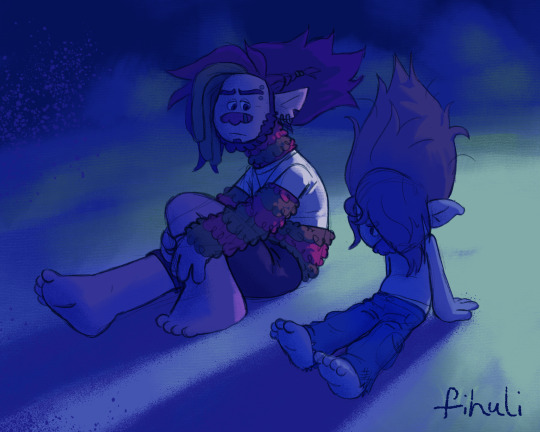
Les wanted to know why he didn't go home like he had said (because that was the only reason Les had even let him walk out in the first place). A few exchanged words later and Floyd broke down telling him all the awful things he'd done, and Les promised to help him, feeling insanely guilty. Floyd wondered if he was allowed back in the band but Les made it clear that the band wasn't good for him and that he was never taking him back. Instead Les helped him go though rehab. I don't think trolls have those institutions (or at least not many are aware of them or how they work (I'm sorry but I refuse to believe the Trolls world has internet and cellphones, Mountrageons can keep that for themselves lol)), so it was more or less just Les finding Floyd a job and his own place to stay in the middle of bumfuck nowhere where he had no option but to detox, and constantly checking up on him to make sure he was doing okay. During this time they grew pretty close again. Or maybe the better term would be that Les slowly started putting his walls down again.
Hed needed a while to warm up to Floyd again. He's almost as protective of Les as Les is of him, and he resented Floyd for the way he had treated him.
Flea is pretty phlegmatic when it comes to any sort of arguing or drama. He was casual about seeing Floyd again, they were never super close anyway.
And Liv, she left the band when she and Hed broke up (haven't decided if that happened before or after Floyd left), so Floyd didn't get to see her again after bumping into Les at the party. And I haven't thought yet if they'd ever meet again somewhere later in life. But if they did, I think they'd both be happy to see each other.
Anyway...
Floyd managed to detox and successfully kept the job for about a year, but then he became manic again and messed it all up. After that he returned to his nomadic lifestyle, but he never fell as hard as those three years again. In my story Floyd's life is a constant cycle of getting his life together and fucking it up and booking to the next place. And he and Les are trapped in a never-ending cat and mouse game where they're both trying to fix each other.
So, uh, Les and Floyd are still very close and see each other somewhat often...
(sometimes monthly, sometimes yearly)
Yeah...
I am so fucking obsessed with them I'm gonna hurl. Please take this song before I combust:
youtube
#btw the status of Floyd's and Les's relationship is forever set on 'complicated'#but they are as obsessed with each other as i am obsessed with them#the song is too soft and vulnerable to be something les would sing out loud but inside he does feel it#papa roach is nu metal btw. tho idk where this song stands exactly#trolls#dreamworks trolls#ex bandmates#trolls floyd#trolls oc#les#answered#my art#btw I am only self educated on the bipolar disorder from what i've read and watched on the internet so have that in mind#my intention is to be respectful but i might not understand all of it. especially not the personal experience of those who have it#i'm just some random nerd#so in a way you could say floyd was diagnosed by a nonprofessional lol#i stayed up until 3am last night writing this#today i made the sketch that is no longer a sketch#should i put this post under a cut? it is pretty long#long post
275 notes
·
View notes
Note
(re: sssniperwolf and jacksfilms) It's laughable that she escalated it that hard. Don't get me wrong, I'm pretty sure stalking him like that is illegal and it's terrifying regardless, but Jack said in a stream (can't remember which one) that he wasn't about bringing up past controversies of hers or cancelling. And now she shows up outside his house (wtf!!!). Like he was willing to only call her out for stealing and freebooting but she's gone and stalked him and Jack doesn't seem like the type of guy to take that shit. Actual WTF moment from her part. wild
omg long post below bc apparently I have opinions: YES!! THAT'S WHAT'S SO INCREDIBLE ABOUT THIS... Jack has been genuinely diligent about keeping things on-topic in his streams, and hasn't brought up any of her other Stuff, or anything Personal. Despite the fact that she kickstarted the whole thing by making it INCREDIBLY personal and attacking his physical appearance... His goal has been to call out and bring attention to content theft, and he's stuck with it. Dude's also cared about this for years, and she's not the first content thief he's criticized. He just hates the way that freebooting has become so accepted-- to the point where youtube praised her for "coming up with such creative video ideas"? Hey! Ew! Dude wasn't trying to get her cancelled though, there was no smear campaign of her character. He's been rallying to get her to CREDIT the creators that she relies on for all of her content. It would set a precedent for all other "react" channels on the platform for one of the biggest channels on youtube to actually give credit where credit is due. Or, god forbid, get permission first? It's not hard. It's already done the job of making some other people who do "react content" self-analyze whether or not their content is transformative, and to maybe care about crediting the creators they rely on for their genre to work. There is a way to make this kind of video that isn't so slimy. And making fun of her lackluster-at-best reactions is so far from even being a big deal. Bc she literally does just sit there and say nothing. Plus, his goal has a clear End built into it: if she started shouting out the creators she takes content from, and put links directly to their pages in her video descriptions, the job would be done! That's what he's asking her to do. Real bare minimum stuff. It legit would have been easy to steer away from the content theft and to also talk about her history of lying to her audience! her ghosting a dying kid with cancer who was a big fan of hers! the fact that she's been arrested for armed robbery! her history of transphobia! He would also get more clicks that way, which is what she claims is his sole goal- to get more clicks. I'll bring it up though! She's been a terrible person the whole time, and has kept a steady course of manipulating her audience of young children and/or, let's be completely honest, simps- into thinking that she's a Wholesome creator. (And now, into thinking she's an innocent victim.) All of the actual effort put in by her has gone toward optics, not the content she puts out. A carefully constructed online persona, for one, but also literal appearances. Jack totally can't say this, bc she already went off the handle and said the only reason he doesn't like her is bc he Hates To See A Woman Be Successful. But I can! That was a cheap shot for her to use that argument when, for once, it's not applicable! Much the opposite, even! Dudes online wouldn't go to bat for her if she didn't look the way she does. And it weakens any case she'd have against him by making baseless claims like that. She banks hugely on being an attractive woman to get her clicks/following. A massive amount of effort is put into her appearance. The makeup, the lip fillers, putting her hair in little pigtails, the chokers and tube tops, the big non-prescription Nerd Glasses, the thumbnails where she has her mouth open in That Expression?
I don't even have to say anything. But making a weird facial expression and putting your hair in pigtails aren't moral failings. Showing up at someone's real life home (whose address you shouldn't even have access to), filming the front of their house at night, doxxing them to your audience of millions of people? Because you were mad at them online? That is fully scary! Yeah girl I'm pretty sure that Jack can press charges! There is absolutely no way to take the moral highground now that she's literally stalked him, and doxxed his home. She tried to goad him and Erin (Jack's wife) out of the house, also, which creeps me out even more-- because what was she planning to do? The fact that she's been arrested for violent crime before does pop into my mind! lmao! Jack was streaming a game at the time that she was outside his home, and these clips of him, his friends, and Erin reacting in real time to what is genuinely a scary situation have been taken down in case he needs to use them in legal action. Shit is legitimately serious!
#sergle answers#long post#LONGEST POST ON EARTH I'M SO SORRY#saying all this out loud only takes a few minutes but typing it... girl this is a BOOK#clearly I have thoughts on this Online Drama but also this isn't online!#these are people who exist in real life. and compromising a person's safety bc he criticized you for stealing tiktoks#is a real life thing. this isn't confined to online spaces! you can turn off your computer to get away from An Argument#but someone going to your house?? that's absolutely terrifying#and all of this is just because he's been telling her to credit the creators. it could have been resolved so simply.#I hope he takes legal action against her bc he genuinely has grounds to do so.#and I can't imagine how terrified and upset I would be if someone was outside my door. filming my house for their audience.#also the 'what if the roles were reversed' argument is rarely made in good faith... but she's already brought up the topic.#this would be getting even more coverage and the optics would be Even Creepier if a strange man with millions of followers showed up#at the home of a woman- just bc she criticized his videos- filming her home address for all to see and trying to get her to come outside.#It's just as creepy that sssniperwolf did this as it would be coming from ANYONE else#it's been downplayed bc her being a little skinny woman means that A Man shouldn't be threatened by her#which. even if she wasn't going to Do anything. any one of her rabidly loyal online followers MIGHT. she's not the only one who could go to#his house now! anyone could show up.#sergle.txt#Jacksfilms#Sssniperwolf
480 notes
·
View notes
Note
Of course Machete brings Vasco closer to god. That may have been a sex joke but like, definitely. It’s the best line in the entirety of Les Mis!
To love another person is to see the face of god.
.
#no I absolutely agree#I feel ridiculous whenever I try to articulate the silly little spiritual subtexts of their chemistry out loud so I just don't#but loving another person deeply is the closest thing to a religious experience either of them gets to encounter#glimpses of divinity and all that stuff#answered#anonymous
239 notes
·
View notes
Note
i think Bubby from HLVRAI could kill Macbeth
Yes, Bubby from Half-Life VR But The AI Is Self-Aware (aka HLVRAI) could kill Macbeth!
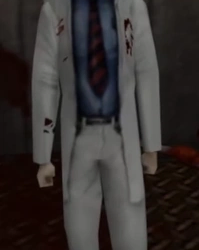
There are a couple of layers to analyze here, but he still qualifies regardless of which one you look at:
You could look at this from the angle that he is canonically an NPC inside a video game, and was therefore coded instead of born by an unknown party. This angle applies him for the Unconventional Birth Clause while leaving BPC completely ambiguous.
You could also look at this through the lens of the in-universe game's story, in which Bubby was a science experiment grown in a tube by Black Mesa, which is directly confirmed through the encounters with his "prototypes"- previous attempts to create the "Ultimate Life Form." As HLVRAI takes place in Half-Life 1, there have not yet been introduced any female scientists working at Black Mesa (later installments of the Half-Life series introduced female characters that worked at Black Mesa, but none appear or are mentioned in HLVRAI), so this angle makes the Birth Parent Clause much more plausible while still firmly applying Bubby for the Unconventional Birth Clause.
Thank you for your submission!
#asks#unconventional birth clause#birth parent clause#hlvrai#half life vr ai#hlvrai bubby#doctor bubby#bubby#dr bubby#ive always wondered how this fandom says HLVRAI#like when youre saying it out loud#do you seriously just spell out all those letters? or is there a generally agreed-upon pronunciation?#i mean no matter what the answer is i will personally continue to say Hell Vray / Helve Ray
199 notes
·
View notes
Text
okay, I'm crowdsourcing advice for a minute, so bear with me and please lend some words if you have any:
I want to get out of the house more. Like, on a regular basis. Weekly, maybe. Preferably, I would like to be interacting with people—the same people—every time, for... like... accountability, but also because I am hoping to put myself out there as the 21st century's most neurotic platonic Casanova. Uh. Making a friend or more out of this would be desirable. But I think if I go out with the intention of making a friend, I will be disappointed.
So. I want to go do something, for that something's own sake. I don't want to go be fake once a week hoping to get a friend out of it.
However, the beautiful state of Iowa is a bit cultureless, and I am too introverted and easily overwhelmed for this world (e.g. going to bars is probably not gonna be my thing). So.... I guess.... any suggestions? opinions? thoughts on making friends in general, or finding good activities as an introverted adult, in general?
oh yeah, also: I am poor. that's a factor. so. signing up a class or similar is not a great option right now.
what the heck, I'll add a silly poll for fun:
#Robin processes emotions on main#Robin speaks#I'm mostly talking out loud here. you know how it is#the question itself is too complicated for an easy answer#and everything will change in January when I become unemployed again and start searching for an in-person job anyway#but hey..... (trails off with nothing to say)#to clarify: right now I'm working part time online#and I'm surviving but my mental health is kind of..... tenuous. I'm lonely. I've got no regular in person contact with non-family#also the young-adults group thing sounds uniquely agonizing. I'm restructuring my entire way of faith right now#and so my choices in a young adults group would be.... either fake it or make myself into an embarrassing... like... Thing#impediment to fun and progress or whatever#I don't want to do that. especially if I'm looking to make friends. it'd be like therapy but public and with strangers and frankly#probably very very midwestern-bland-white-evangelical and I don't know if I can take it... I don't know if I can do it#yeagh#OH. ALSO. BY THE WAY. when I say ''a friend or more'' I do NOT mean a friend or romance alsjdflsjdlkdfjsjla#I mean ONE OR MORE friends.
46 notes
·
View notes
Note
🍊⚙️ mod, I don't know if you've ever been told this but I love the little statements you leave in the tags occasionally. I really like selfship confession blogs that respond to things(which I completely understand can be a hard thing in general with so many asks, nonetheless ones that can be upsetting and it's not restricted to being just lighthearted confessions), but it's hard for me to find confession blogs that do that. One of the few that I did find that responded to things they didn't even respond, they'd respond with things like "this is irrelevant to the ask but I am so tired today" and it bugged me a little cause like... why respond at all then?? I'm not throwing shade or anything to the blogger, it's just like opening a little goody bag to me to see what you've typed in the tags.
Anon you have no idea how happy this makes me (the way I IMMEDIATELY went to fawn over it to the other mods helpp hehee)

I was a bit nervous about it at first, actually, since it seems like I do it for every post I queue, but after seeing how positively people have responded to it so far, I'm like. Whehawhew!!! y'know?! <3
Consequence of being, and I quote in my very own words from (probably earlier than) Sept. 23rd, "unapologetically A Yapper" <3
#hehe a little inspired by the amount of back and forth I'd have with ⭐️ mod on my own asks. I always loved the engagement. So me doing that#while I answer them as a mod myself now. Feels only natural. I hope to strike that same feeling for everyone else too. :3#idk. if i can improve the day of at least one person through my silly commentary then my job is done I think <3#also idk if you guys can tell which ones I queued otherwise if I don't add commentary#but any I don't say smth on just know I probably said 'REAAAALLL' on out loud instead. /silly#and honestly? working on desktop kinda has an advantage for me in regards to me (trying) to comment on all the asks we get. I love it#I find it fun. idk. I just like doing this. Got that 'Clearing out our entire queue in one go because it's mostly repetitive motions' tism/#This is getting sappy and long. I love this community and being able to give back by being a shoulder to lean on. Means a lot to me <3#... I swear Oscar if you edit this to call me a nerd I'm going to GET YOU /SILLY-🍊⚙️#self ship#self shipping community#selfshipping community#selfship#self shipper#self shipping#self ship community#selfship community#f/o#f/os
26 notes
·
View notes
Text

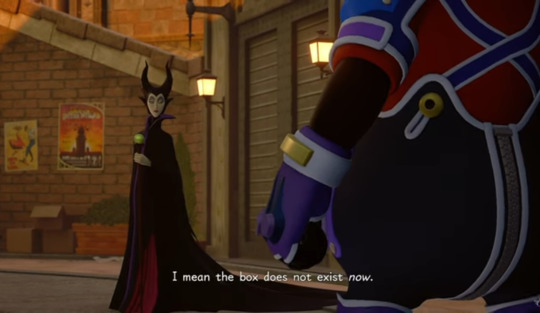
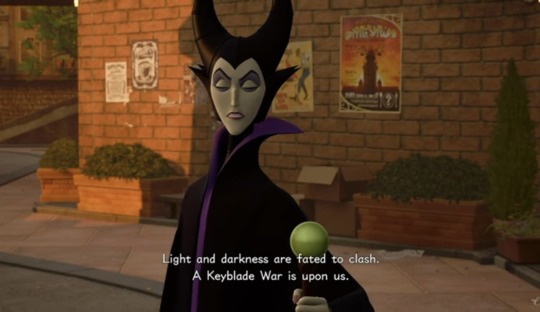
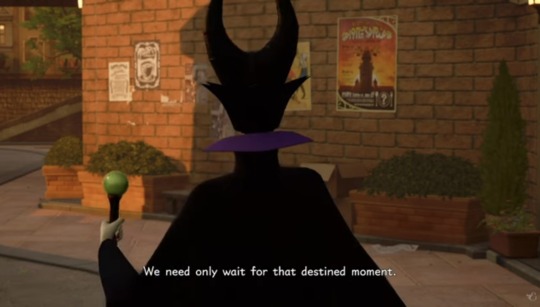
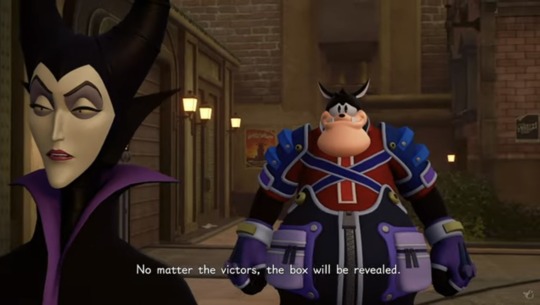
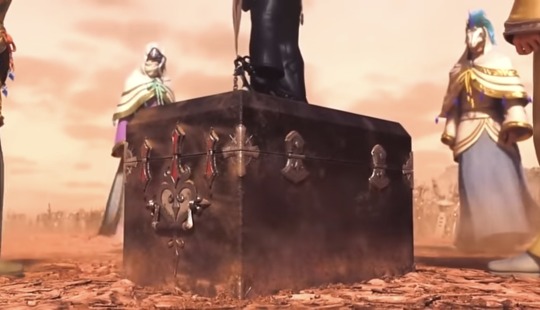
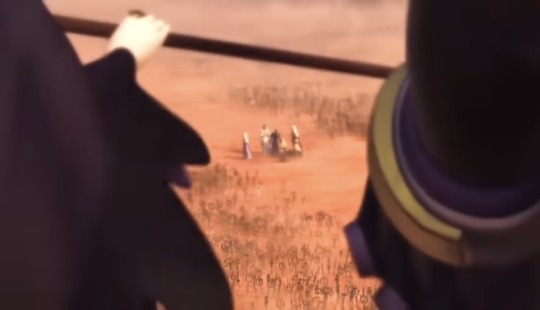
It’s already been suggested by others that what was lost was Master Ava, and what was found was the Black Box. Revisiting some of the cutscenes that relate to the Box, Maleficent implies that it doesn’t even exist until this moment at the crossroads. This left me wondering what triggered it to reappear, considering that Xigbar sent Luxord to look for it before the war took place.
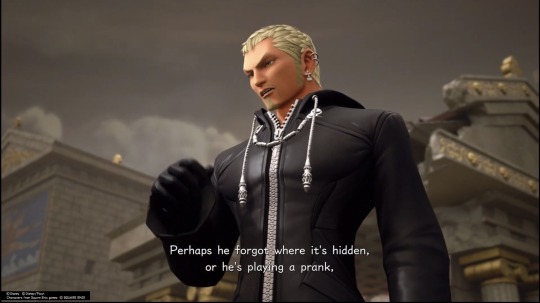
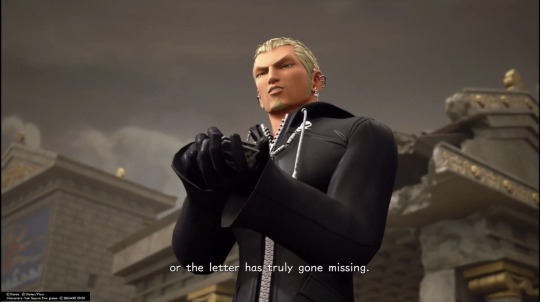
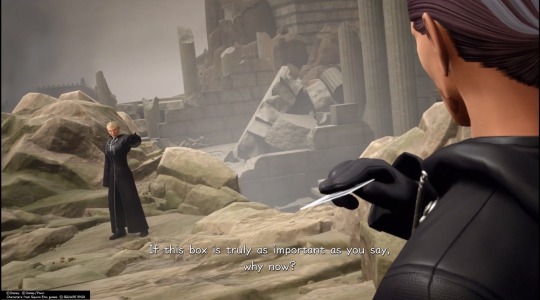
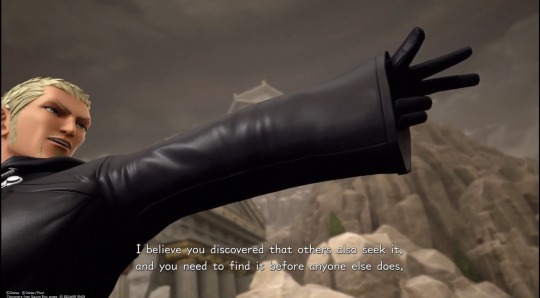
This other scene seems to imply that, in spite of Luxord’s assumption, Xigbar was probably also the one who sent Maleficent and Pete looking for it too:
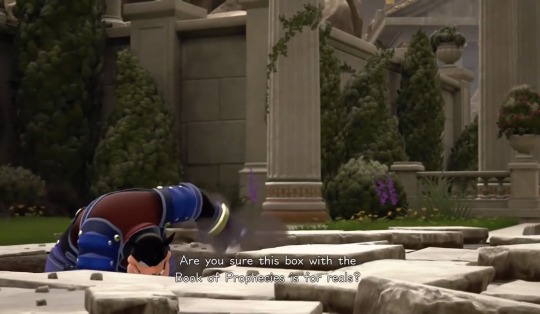
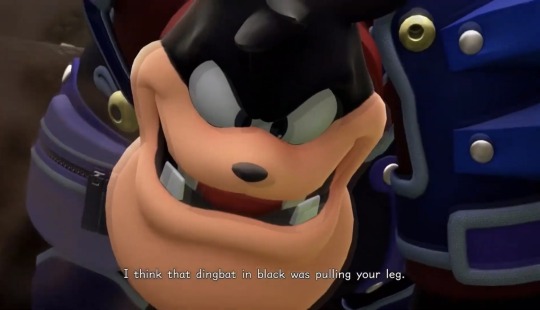
It’s worth noting that Maleficent and Pete are under the impression that the box contains the Book of Prophecies. Potentially a manipulation by Xigbar to incentivize them, but I do think there’s a connection between it all.
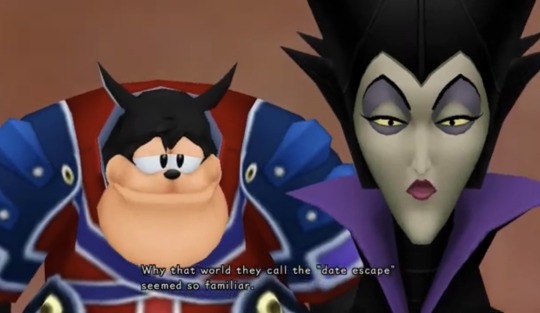
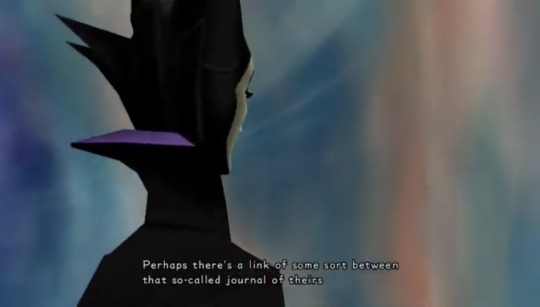
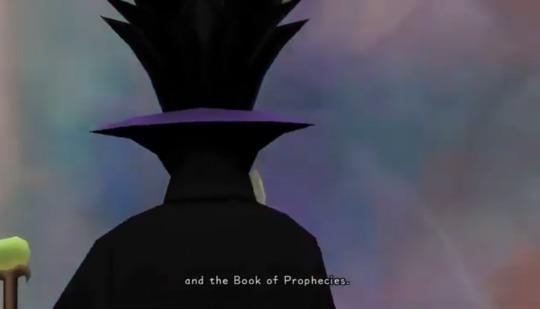
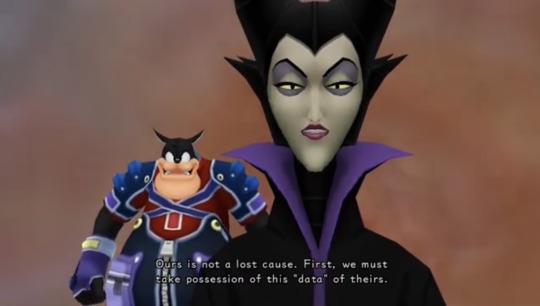
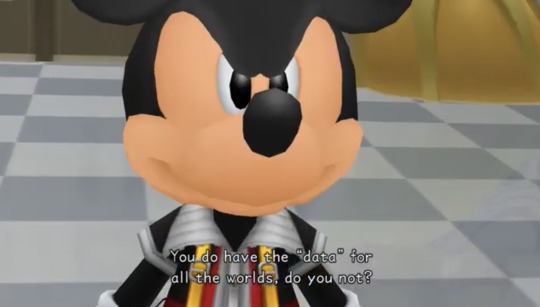
Maleficent draws a connection between the data world of Khux, and the datascape of Recoded—both contain the data for all the worlds, albeit at different points in time. I don’t necessarily think the Box contains a physical copy of the book, but rather: as Jiminy’s journal is to the re:coded datascape, the Book of Prophecies is to the Box. The Book is the hard copy, the Box contains the data version.
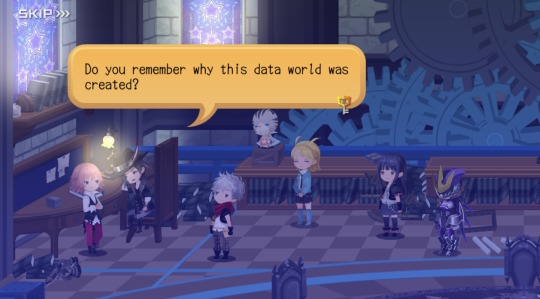
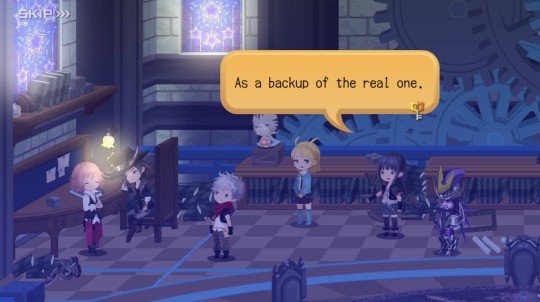
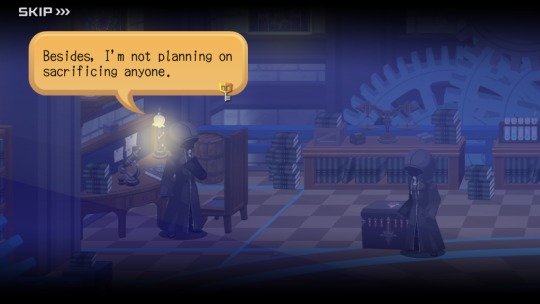
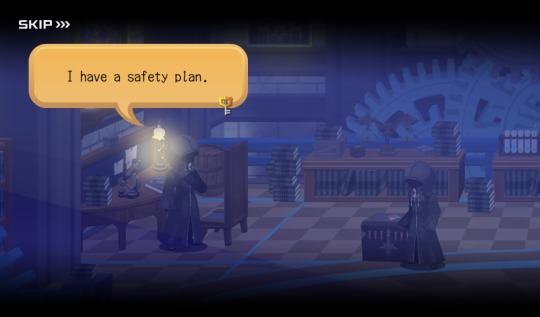
This matches up with the irl meanings for a Black Box too:
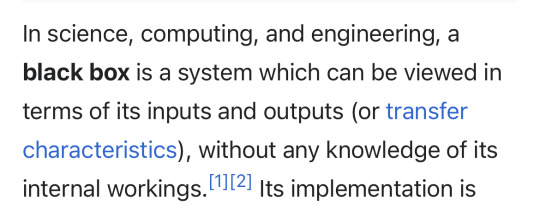
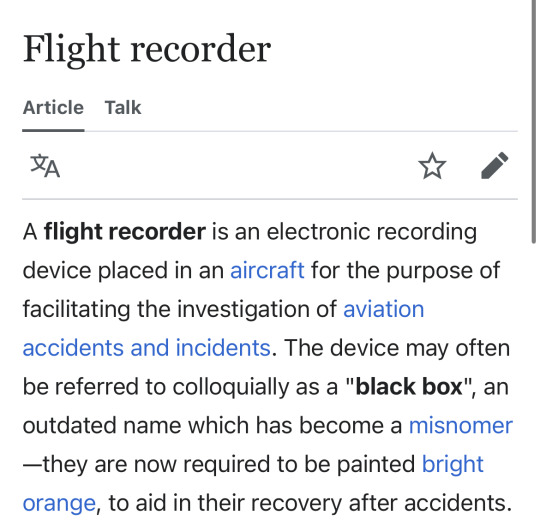
The input being the book, the output being the data. The inside is a mystery. It’s a system that serves as a backup… probably in the case of the worlds being purged? If that’s the case, the Keyblade War (or more specifically, the summoning of KH) being what triggered the Box’s reappearance does make sense, because the world was almost purged. It was probably sent to Quadratum / outside the realm of existence to survive the purge, hence why it “did not exist”. Maybe it would then be returned after the war, in case it was needed to rebuild the world. This doesn’t really explain why Xigbar had apparently lost track of it though, or why he thought it was still in the Realm of Light.
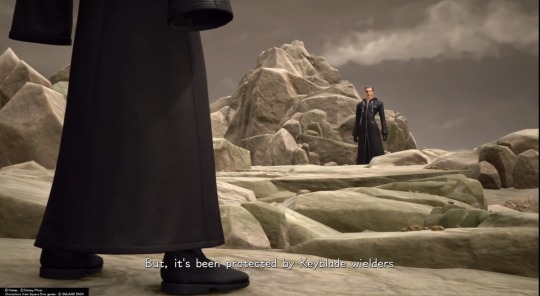
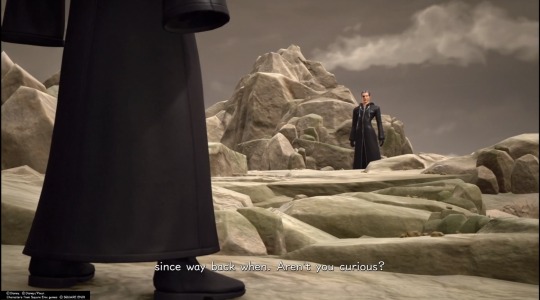
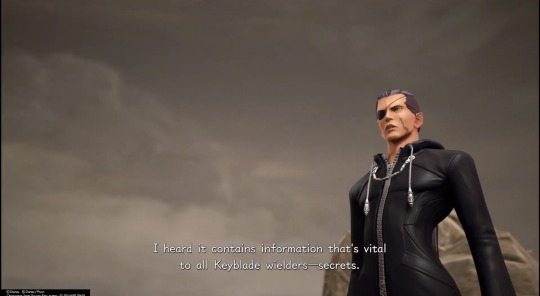
(There are also four Darknesses trapped within the Khux data world, which means they likely would have survived any sort of universal reset… )
Assuming I’m right, I wonder what could’ve happened so that the Box ended up in Unreality? Is that also why the Heartless/darkness are present in Quadratum in kh4? It’s probably a question for Missing-Link to answer, as well as why the Lost Masters might have been there too:
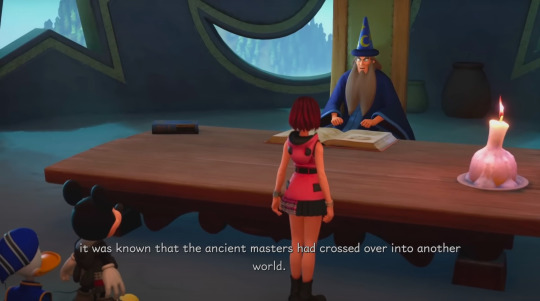
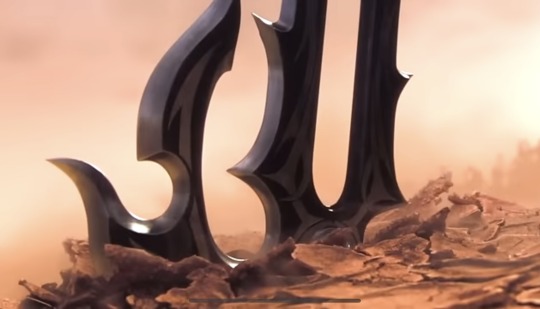
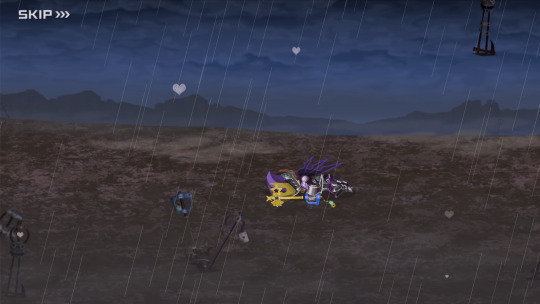
Lastly, jumping back to analyzing the epilogue, No Name is also found in this scene, and we see it fall into the ground (just like what happened for the fallen Keyblade wielders in KHUX—which is what formed the crossroads to begin with.) There isn’t as much to say here, but I will at least argue that Xehanort’s death is also a ‘loss’ that resulted in something being gained.
#Kh parallels#screenshots#I’m mostly thinking out loud here#and I’m definitely not the first person to suggest any/all of this#Really there’s just not enough info to have clear answers#And I don’t understand the strategy / plan revolving around the Box yet#But I’m curious. So I gotta try.#If the true darknesses are in the lost masters’ (and Ven’s) hearts and the Khux datascape (the box?)#what would a purge actually accomplish if all but one of those weren’t present in the realm of light when it happened?#Maybe it’s more to get rid of the excess darkness that’s spread and multiplied over time?#Darkness like Baldr’s darkness in khdr. Because I don’t think that one was one of the true 13#but they still considered purging the world to defeat it#*sigh* idk#I should just wait for the next game haha
27 notes
·
View notes
Text
"that thirst for payback, it's not why orthax was drawn to us, it's why we were drawn to orthax!"
just thinking of "did it choose me because i was broken, or did it break me?" again
#bc like i haven't watched s2 since it came out so my memory's a bit foggy but we didn't get the percy/raven queen conversation right?#just the vax one?#but yeah this is definitely a fun place to put it! get your answers from the person you hate to the questions you haven't asked out loud#cr spoilers#cr liveblog#tlovm#the legend of vox machina
40 notes
·
View notes
Text
i used to freehand comics all the time as a child and since the part i liked was the drawing part i would just draw panel after panel because i didn't want to stop drawing to think about icky icky words, plus the story TOTALLY still made perfect sense! to me! and noone else, but 'whoooo caaaaares omgggg its not like comics and sequantial art are a communicative meeediummmm lmaoooooo'. i spent my entire childhood telling myself stuff like "oh pfft I know this story by heart- ill SIMPLY remember the dialogue and write it later" ...and. I can't help but admire baby maiora's (call that a minora ba tm tsk) fucking audacity? hubris? confident wrongness? kid couldn't even remember to finish the comics in the first place? INCREDIBLE levels of unearned self assurance, wish that were me, genuinely- what an icon!!! anyway i think i have forever cursed myself
#maiora garrulates#the maiora overthinks the process of writing dialogue saga continues!!!!!!!#im so tired. i have been overthinking this shit in circles i have not been making any progress in any which way lmao!#im bitching and moaning for funsies this is not that serious in the Grand Scheme Of Things i just wanna improve at my fav thing#and ❤️ Unfortunately ❤️ my favorite thing in the world involves learning MY MOST HATED *NEMESIS*!!!!!!!!!!!!!!!!!! verbal communication. ew#words are fun! i LOVE words! toys!!!!! im using words right now and i didn't combust!!!!! wow look at that!!!!!!!!!!!!!#putting words in SEQUENCE? multiple times?? filtering THOUGHTS into SENTENCES???? sentences that a character would or wouldn't SAY???#AND THEN THERE'S ANOTHER CHARACTER SOMETIMES???? AND THAT BITCH ALSO HAS THOUGHTS AND FEELINGS????? AND THEY ALL HAVE PERSONAL IDIOLECTS#AND TONES THAT S U P P O S E D L Y ARE IMPLICATED BY MANNERISMS AND VERBAL HABITS AND CIRCUMSTANCES (AND THERE'S WRONG ANSWERS! ALSO!!)#AND THEY'RE IN A CONTEXT!! AND THEY'RE INTERACTING WITH EACH OTHER AND INFLUENCING EACH OTHER!!!!!!!!!!!!!!!!!!!!!!!#THE CONVERSATION COULD VARY GIVEN ENERGY LEVELS WHETER OR NOT SOMEONE'S FOOT IS FALLING ASLEEP THE F U C K I N G WEATHER#“oh dialogue is easy just say it out loud to yourself until it 'sounds normal' ^^”#screaming crying throwing up NONE OF THIS IS INTUITIVE TO MEEEEEEEEEEEeeeeeeeeeeeeeeeeee....!#ok dramatics over its out of my system! for now!!!#this is all easily explained bc i just. draw a lot more than i talk to people. so like. OBVIOUSLY i have more practice drawing#so drawing comes natural! talking does not! subsequently dialogue is Hard! No FUCKING Shit Sherlock!!!!! (affectionate)#so yeah. im using y'all (the tumblr void) as practice! hi!!! words at you!!!!!!!!!!#so yeah thanks for baring with me while passing by my corner of the internet#i do love self indulgence this is fun check out my navel gazing actually no do not look at my belly button#anyway i just think this is mildly interesting. some of my writer buds have the same “not good enough” allergy towards visuals#but they use it to be mean2me >:( same bitch that “omg i cant i suck at drawing i can't do this-” does the “uhm. just write? lol.” 2 meeee#we could have peace and love on planet earth and a common experience and yet you KICK miette for being bad at words!!!1!!! </3 heartbreak!!#what the fuck was i talking about even#oh yeah. perfectionism within creatives i guess. LMAO JK i am talking about NOTHIN!!!!G i am just putting Words Out Here ehehehehehe#its practice >;)c#all this bc ive been doodling comics for myself again and im V!! PROUD OF THE ART!!!! wanna share- but DIALOGUE!*⚡sfx!!*....... so! options#a) leaving it blank. no there are NO microphones in the budget. b) leaving blank *balloons* so that the Rythm is there. implied convo!!!#c) ...doing it badly. (tragic)(heartwrenching)(teeny tiny bruise 2 the ego) *dramatic single tear cleches fists * its the only way.........#...we shall see! literally none of this is all that serious i am procrastinating!! <3 playing with my tuoys!!!!!!!! silly time!!!#/all lh! am reaching 30 tags so that is all for THIS episode of the maiora bitches about dialogue saga thank you for joining me!!okilyBuhBY
21 notes
·
View notes
Note
Hello! I hope I’m not bothering you. I just feel confused about what I keep missing in episode 63, and I’m wondering what characterization or moments of detail I’m missing out on about Orym purposely enabling Delilah’s revival, or letting it happen? I had totally misremembered and thought that Hunger of the Shadow killed Bor’dor and so Orym nodding was a “We need to do this” that had multiple interpretations and Consequences. I had always thought it was a really ill-timed “He needs to die” that happened before Laudna used Hunger to kill Bor’dor
but after rewatching the whole fight, I realized Hunger of the Shadow only knocked Bor’Dor unconscious. The failed death saves came from Prism’s punch and Wither and Bloom. And it turned out Orym’s nodding thing came after Hunger of the Shadow and Delilah’s heart started beating again and not before like I had thought, so now idk what it is that Orym did that lead to Delilah’s return? I keep rewatching the fight trying to figure it out but I’m not seeing it 😭 Liam on 4sd and Beacon discord said that after Orym clocked that Delilah was probably back he thought that Delilah would be helpful against the Vanguard (this aged well :’D), but Orym’s suspicion that Delilah returned happened as Laudna was killing Bor’Dor and got “30% scarier,” not before Laudna decision to kill Bor’Dor or Hunger of the Shadow. I’m trying just to figure out how he could have “let” the revival happen before the fact? Because it’s a common topic of discussion among critters but now idk what it’s referencing?
I guess an argument could be made that nobody stopped Laudna before she did hunger of the shadow, but again I don’t think anybody was thinking of Delilah? My personal interpretation was that on Laudna’s turn in initiative, the party simply saw Laudna attacking Bor’dor and didn’t discourage it because guy had just betrayed them and dealt 10d4 acid damage to everyone— and not because they saw any strategic benefit in Laudna attacking. When the purple eyes in the Form of Dread appeared, I had just thought that was a manifestation of Laudna’s hurt at being betrayed again and tying it to Delilah (but that’s just my interpretation). Taliesin definitely clocked that eye color, look at his face 😂 But I can’t see how the characters knew beforehand that Laudna was specifically intending to make a move that would revive Delilah? And that this was a move that was strategic to enable? And Orym didn’t even suspect Delilah until Bor’Dor’s death with wither and bloom.
Are the purple eyes why critters keep bringing up Orym? But then that has nothing to do with the Nod that is moreso getting brought up. And wouldn’t Ashton get equal mention before Ep95 aired because they both didn’t stop Laudna on her turn?
The timeline beats I’m getting are that it’s Laudna’s turn in initiative after she counterspells Bor’dor’s attempted polymorph. On her turn, she does Form of Dread wit the purple eyes then casts Hunger of the Shadow, dealing damage and knocking Bor’Dor unconscious. Then she feels Delilah reawaken within her through the heart beat.
It’s now Prism’s turn and she punches Bor’Dor, autocritting and taking off 2 death saves.
Laudna’s form has been darkening and at this point, the mourning veil appears over Laudna. Liam notes that Orym has been watching, silent. Ashton also sees all of this and drops their rage. When it’s Laudna’s choice whether to end Bor’dor, Orym nods. Laudna is barely present and is cycling through her own trauma and memories at the moment, then she makes her decision and uses Wither and Bloom to kill Bor’Dor. Familiar purple flame and green light that Ashton and Orym recognize manifests as flowers bloom and Bor’Dor form cracks and withers.
So Delilah had already been revived before Prism punched Bor’dor and Laudna dealt the last death save, so I guess I just feel confused about what is Orym’s connection to Laudna bringing back Delilah?
The nod was endorsement to kill Bor’Dor. At that point that’s what the conversation was about, whether or not Laudna was gonna kill him. Delilah had already been revived
Like yeah Orym saw some potential advantage with Delilah once he realized what had happened, but he didn’t seem to cause any of it? But it’s a point constantly brought up, so I’m feeling confused about how it happened.
Sorry this got long. I tend to ramble
hi anon, thank you for being respectful and curious in this message, instead of coming at my throat. i appreciate it more than you know! i will do my best to explain this perspective
in the time between laudna's resurrection and bor'dor's death, the presence of delilah was questionable at best. they had "sundered" her in laudna's mind palace whitestone, pike seemed to think delilah was no longer present, and delilah was completely quiet for that stretch of time. i think a lot of people were waiting for the other shoe to drop, but there was also the idea that maybe she really was gone, or at least significantly weakened.
chronologically, here's what happened during that fight. bor'dor reveals his true alliances and turns on the party. per liam's statements in 4SDx14, orym decides that bor'dor cannot be allowed to live, because of the danger that any ruby vanguard member poses to the general public and other innocent lives. laudna says this:

she casts hunger of the shadow. prism does a bit more damage. then, as bor'dor falls:

the "faint shimmer of a mourning veil" explicitly mirrors the pre-resurrection form of dread and definitively reflects delilah, suggesting that delilah's influence is visibly returning. then, liam says this:


("you just see this" is where he nods.) per liam's statements in 4SDx14, orym realizes that laudna has opened the door again for delilah to reemerge, but he also thinks, "yeah, we're gonna need that." (liam's words, not mine.)
laudna casts wither and bloom for the hdywtdt, with the following description:

please draw your attention to the statement that the world has broken her and that she was trying to keep this dormant until she couldn't anymore. she is barely there, she has lost herself. more on this later.
with this information, it's inaccurate to say that orym caused delilah to come back. she already came back, as we can see with the chronology above. i will admit that i didn't realize the nod came after the veil, and i think that's an important thing to clarify. i will also say that most of us never fucking said that he caused delilah to come back in the first place, but i digress
this is a total sidebar but i think there's also an important distinction to make between orym deciding bor'dor needs to die because he poses a danger to the civilians around him (again, per liam's statements in 4SDx14), vs. laudna deciding bor'dor needs to die because he betrayed her. one is calculated and intentional with an understanding of the big picture and its consequences. the other is deeply personal and impulsive and blind to the consequences. this could be a separate post but suffice to say i think that when you're approving of your friend killing someone, it matters why they are killing them, and it matters if their "why" is different from your "why" because it will affect them differently than it would've affected you after committing the act. because of this, it could be argued that letting laudna kill bor'dor negatively affected her psyche more than if the roles were switched and laudna let orym do it, because orym could see the bigger picture and laudna was simply coming from a place of pain. it was a huge character moment from orym, i think it's fascinating, and i don't think it was wrong from a storytelling perspective even if it could be argued either way from a morality perspective. so i'll just leave that there.
anyway, the reason this is all relevant, is because it is a reflection of what orym says in ep 95, which is "you're right. why do i need the help of some dark force?" intended to suggest that she shouldn't cast judgment upon him for using a dark weapon when she uses the dark magic given to her by delilah.
what many people have tried to bring up about this statement is the issue of choice and agency. orym picked up otohan's blade and decided it would be meaningful to him, and also empowering from a mechanical standpoint, to wield it. which is fine, for his character story! laudna might not like it, and fearne might not like it, but it's something he did, and it's interesting! but the sticking point is that such a level of intention and purpose is simply not present in laudna's story. it could be argued endlessly how much of every laudna decision is actually laudna vs. how much of it is delilah, but regardless of what you think, it is plainly true that, in the high stakes and game-changing choices, at least some part of it is always delilah.
and per marisha's description above, laudna was trying to keep that dormant within her for a long time. it wasn't until bor'dor that it was unleashed in full. and in that moment, delilah's process of overtaking laudna completely was kickstarted. that isn't to say that delilah would've never come back if bor'dor didn't die the way he did, but it is to say that it happened earlier than it otherwise would have, and it's been a slippery slope of dwindling agency and psychological power-hungry manipulation ever since then.
the point of the argument is that it doesn't feel fair when laudna says "how dare you use that dark blade," for orym to throw it back at her and say "the same way you dare to use delilah." because orym wanted to use the blade for its power no matter the cost, and orym thinks delilah is useful for those same reasons, so for him perhaps they can be equated. but when delilah came back in ep 63, laudna didn't want her to. it broke her and it happened in a moment of terrible pain and anguish after weeks of trying to keep her at bay, and she hasn't been able to stop it ever since. and she's been getting mixed messages from orym and everyone else the entire time about whether she would be more useful if she just gave in entirely. but nobody seems to like what she turns into when she gives in even a little bit. nobody seems to understand that they are gravely underestimating how corrupt and dangerous laudna will get if they let this go unchecked for the sake of gathering more power to take down ludinus.
at the end of the day we're just people who think laudna is an interesting character with a vastly complicated psyche that dictates why she made a choice like this, and we were pointing out something that orym said that felt unfair to those nuances. in response, people have been painting us out to be demonic and illiterate misogynists who are stealing away laudna's agency and blaming her entire warlock pact on orym who's just doing what's right. forget being unfair to laudna, that's unfair to the equally interesting arc that liam is creating with orym, of an ambiguously levelheaded, hypervigilant, war- and grief-driven soldier. we should all know by now that liam is not interested in making infallible characters, but you wouldn't know it based on the amount of backlash being thrown at us for pointing out that hey, maybe that one thing orym said was flawed.
anon, if you've made it this far, please continue to be kind and ask questions of others to understand their perspectives. i appreciate you.
#and the reason ashton hasn't been brought up is simply because ashton didn't play a huge role in the ep 95 talk dkfjsdf#sorry this is soooOOOOOO long#but i figured this was a good opportunity to just lay it all out there#be nice to people for crying out loud. we're all coming at this incredibly complex story from different angles#it's not meant to be taken apart in the same way by every person. that would make it boring and that would make it antithetical to cr.#anonymous#ask#answered#long post#critical role#cr3#cr spoilers#cr meta#*meta#cr fandom#cr negativity#laudna cr#orym cr#r: laudna x orym
31 notes
·
View notes
Text

YEAAAAAAAAAAAAAAAAAAAAAAAAAAH ED BOOKER!!!!!!!!!!!!!!!!!!!!!!!!!!!!
#tani's personal shit#THE CROWD CHEERS!!!!!!!!!!!!!!!!!!!!!!!#(ME)#aw2 lb#lakehouse dlc#alan wake#does this mean this is set after return 1 but presumably before return 3? or theres also time fuckery here?#/dont answer im just thinking out loud
11 notes
·
View notes
Text
"We can get through this by working together, reach out to your friends, community is all we have, a social network will be your security in the world, now is the time to lean on others!"
I do agree, and it's scientifically sound (pretty sure there is data about how people with better social networks live longer and etc) but also....augh..... what about the severe social issues, difficulty to leave the house, physical issues which lead to like zero socialization energy a majority of the time, etc. etc. Social support can be a replacement for structural support, but.. I guess I just wish it didn't have to be. Community is extremely difficult to build, even moreso if you're someone who has issues with social cues or group conversations or even just being around others in the first place. And blah, nuance, of course I'm just complaining or maybe being too negative or maybe misunderstanding, but, I hardly have the energy to brush my hair once every 2 months.. how am I supposed to maintain a wide social network and be active in a Community and Join Groups lol... sometimes it kind of feels like "er.. well if thats my only option then...... ruh roh". It's overwhelming
#Kind of like some post I saw a long time ago talking about how even the meanest shittiest most difficult to get along with#elderly people or whaever still deserve to have some sort of systems in place to support them so they're not just relying on the#grace of relatives or etc. who may not be able to deal with them. Not saying that I'm like mean and cruel or anything#but the fact of the matter is in most social situations either I am compromising or the other person is. Not in like an ~`ouuu im so weirdd#nobody willever understand my quirky swagg hee heee~' way but like a.. Just factually the things that make me happy and comfortable#are often incompatible with people. The way I communicate and process things is different from the way other people do and that#is always a barrier. I cannot have ''easy''' interactions. Even with 'understanding' people there is nearly always a significant#amount of effort. You can't walk into a group of people and then be like ''okay you guys all have to wear#masks and you also cant play music too loud and also we should communicate turns of speaking very clearly so group conversations#arent too stressful. and also i need this and that and we have to do this and that and '' etc. etc. You CAN. And some people will#go along with that. but they will ALWAYS secretly resent you for it. You will be the one person they're relieved to not have to be around.#theyre glad when you dont show up since they can go back to doing things however they want and not masking and all these boring#annoying things. OR you can say none of that and just deal with the loud music and the talking and the unmasked people. but then#YOU'RE compromising. and no matter how nice they are it's exhausting to be around and youre just further alienated#while in the presence of people and uncofmrtoabel the whole time.#Which I'm not saying the only form of community is a group setting specificially but just giving that as an example lol#I just wish there were a better option than ''well learn to socialize normally or just suffer then'' . Which I know is not what people are#saying. I guess I just always feel a bit scared when 'community is the answer'. Since its not like 'oh im just socially anxious and need to#get out of my shell~!' or something thats really that remedy-able. It's like.. my mostly unchangeable physical health issues combined#with the mostly unchangable literal way that my brain processes sensory informationand other things means that interacting with#others in a normal and easy way is incredibly difficult and often exhausting especially to maintain in any longform fashion. So then#when it's like ''the answer to staying safe is to maintain longform social connections!! :3 just reach out!!'' then.. ermm... O_O#also I'm not even one of the cutesy shy emotional hermits that's nervous. I'm the Bad Stereotype emotionless robotic cold seeming#looms in the corner of the room type of thing so people have less pity on you in that way. -_- ANYWAY gghj#I need like.. a designated social representative or something.. When I did work in that bookshop forever ago they gave me a#person who basically was just with me to help communicate with others on my behalf and supervise me and stuff. I need that.. Some#more extraverted person I can latch onto and they can maintain the Social Support Network for me and I can just be their +1 to all#of the Social Things and community. I have helpful skills I can contribute to other people and stuff it's just like.. I cant socialize lol#I cook food or something for you.. then you keep me in contact with Community.. a deal. (but then what about when I'm too sick to#contribute? as is often the case. there's not much place for people like me in communities sometimes i fear.. sigh.) ***
13 notes
·
View notes
Text
.
#i started psychotherapy and he started talking in hebrew#but i like understood it??#it was simple but my issue isnt vocab so much as its just auditory comprehension which i sometimes struggle in english with too#we did switch back to english tho becuase i was like mAh??#since if im not expecting someone to speak hebrew i need a couple seconds to translate#im still bad at switching back and forth but i imagine it will get better after i move#and get more practice#its nice though not having to lie to a doctor about my situation since were in the same community#and its nice to say shabbat shalom on the way out#he did lowkey interrogate me on why i want to move to israel and i never feel like i can give a good enough answer in words#like i feel it in my bones is a fucking weird thing to say out loud ok#its in my bones doc#my skeleton yearns for the hummus#personal#silly things#jumblr
7 notes
·
View notes
Text
Also, can I just say, what the hell, you guys!? Maia was solidly winning that new tarot illustration poll for nearly the entire week it was up! I was plotting her illustration! Thinking of her theme and which card to use for her...! Then out of nowhere you all dumped every single vote on Audric... FOR SHAME. (secretly glad because I haven't gotten to draw him in a while and his next scene in the comic isn't for a lil while longer still.. unless we count the post chp 3 omake, but that is Kid Audric and that's different) But now I have to put on my Audric thinking cap instead of Maia! For. Shame.
(Oh, what to do for him, what to do for him...)
#solivaga#oh and to the person who keeps requesting audun#trust me I hear you loud and clear... i want very badyl to go ahead and do a card for him#I've got one already planned out too#which is... possibly sad#But it's the perfect fit so how could I not plan ahead!#really need to get back to answering asks again I've been rushing to catch up on all the work I missed#but I don't like leaving my tumblr too quiet#I want to... engage!!!
19 notes
·
View notes
Text

I love how you can purposely cater you internet experience to block most politics so you can mentally detox since your media consumption was becoming unhealthy, and still have a whole week of attempting to regain your hope in humanity become completely undone by wanting to eat lunch with your mom (ramble in tags, feel free to ignore; take care of yourselves first <3)
#politics#us politics#tags so people can block this post#it's just so cool and awesome that things work like that#i was genuinely doing so much better#i was engaging with news in a healthier way#i was fixing my focus on what to do moving forward#but then i had the audacity to want to eat lunch with my mother instead of holing up in my room#she turned on fox news and i tuned it out... talking about stuff with them always turns into debates and its mentality exhausting#so i generally just keep my mouth shut unless asked#but then she started commenting on the news out loud#and so being a personable person i did my best to respond#they were talking about mass deportation of ''illegal criminals'' and she asked out loud why they havent sent them away already#so i said “oh well its expensive and there's not always places that are willing to take them”... left my opinion on the sentiment out of it#that was the WRONG thing to say apparently#devolved into a debate where she ultimately said “ok but it was a rhetorical question and i didnt actually want an answer”#how was i supposed to know that????? im the only person in the room??? thats not what rhetorical questions are used for??????#so we moved on from the topic#she said something along the lines of “pff and people come in illegally and still want to seek asylum”#so again i speak up#told her (with a quick google search to back it up) that people can either apply for asylum at the border or after entering illegally#as long as its within a year of entering#that was ALSO THE WRONG THING TO SAY#she reiterated that she still wasn't asking and added “im just watching the news; i dont want to google anything”#and im like...#...one; she mentioned in her “thinking out loud” rambles that she's aware that i dont like to talk about this stuff with her#but that this stuff is important to talk about... which i took as a “why won't you talk with me?”#so ouch#but also... whY ARE YOU WATCHING THE NEWS IF YOU DON'T CARE TO VERIFY ANY OF IT#im out of tags to ramble in but I'm still so hurt and mad and i have been reminded how little people care about compassion and factuality
8 notes
·
View notes